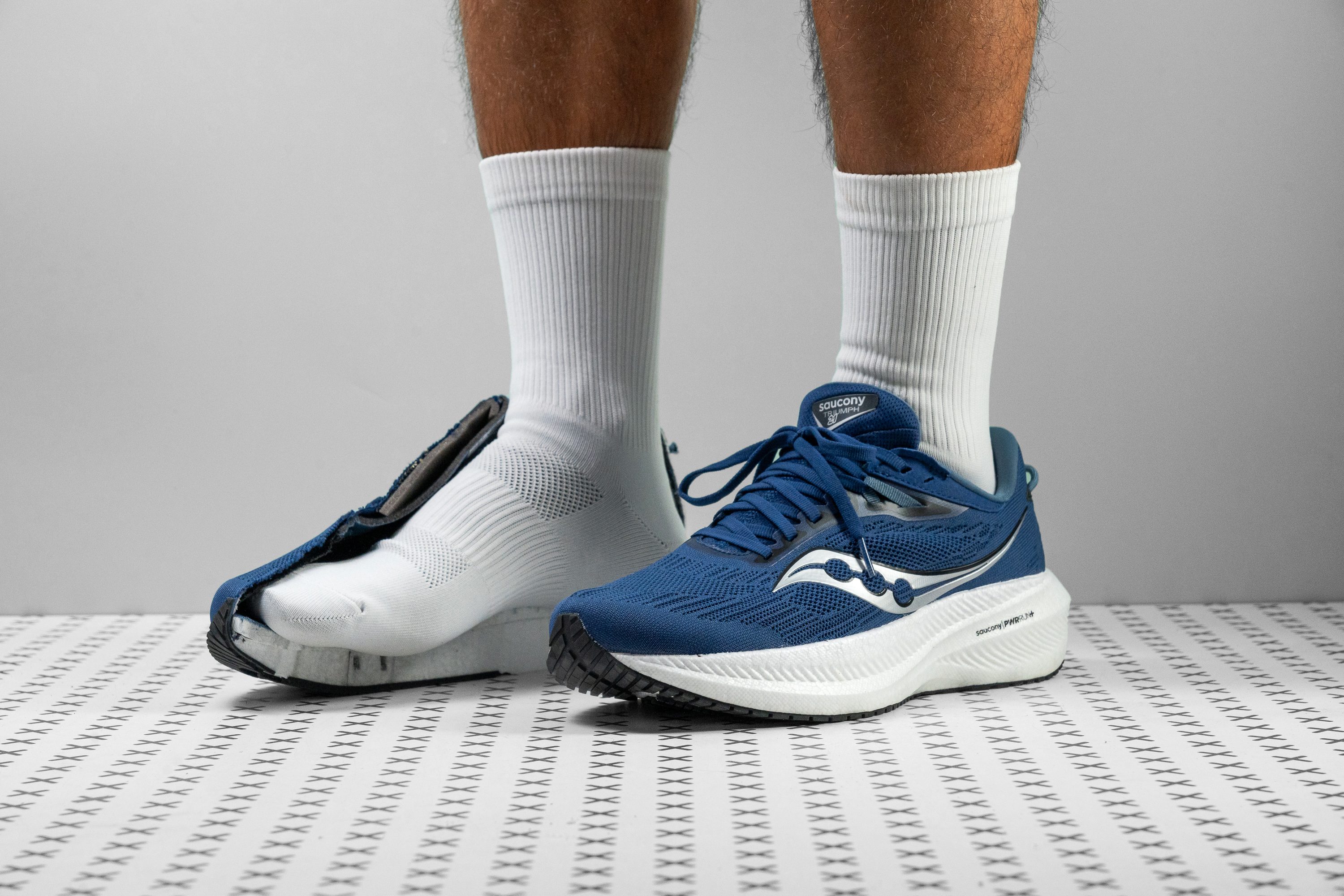Our verdict
- Top pick in best treadmill running shoes (2023)
- Top pick in best Saucony walking shoes (2023)
Pros
- Ready for wide feet
- Exceptionally cushioned
- Durable outsole
- Comfortable and breathable knit upper
- PWRRUN+ responsive foam
- Softer midsole than v20
- Versatile across different running paces
- Weighs under 10 oz!
Cons
- Not suitable for those with narrow feet
- Drop might be too high for forefoot strikers
Audience verdict
Comparison
The most similar running shoes compared
+ + Add a shoe | |||||
|---|---|---|---|---|---|
| Audience score | 87 Great! | 89 Great! | 87 Great! | 90 Superb! | |
| Price | $160 | $160 | $170 | $180 | |
| Pace | Daily running | Daily running | Daily running | Daily running | |
| Shock absorption | High | Moderate | High | Moderate | |
| Energy return | - | High | High | High | |
| Traction | Moderate | Moderate | High | High | |
| Arch support | Neutral | Neutral | Neutral | Neutral | |
| Weight lab Weight brand | 9.9 oz / 282g 10 oz / 283g | 9.9 oz / 281g 10 oz / 284g | 9.6 oz / 272g 9.3 oz / 263g | 10.3 oz / 292g 11.4 oz / 323g | |
| Drop lab Drop brand | 10.5 mm 10.0 mm | 8.9 mm 8.0 mm | 10.0 mm 10.0 mm | 10.6 mm 10.0 mm | |
| Strike pattern | Heel | HeelMid/forefoot | HeelMid/forefoot | Heel | |
| Size | True to size | True to size | True to size | True to size | |
| Midsole softness | Soft | Balanced | Balanced | Soft | |
| Difference in midsole softness in cold | Normal | Small | Small | Small | |
| Toebox durability | Decent | Decent | Decent | Decent | |
| Heel padding durability | Decent | Bad | Good | Good | |
| Outsole durability | Good | Bad | Good | Good | |
| Breathability | Moderate | Moderate | Moderate | Breathable | |
| Width / fit | Medium | Medium | Medium | Wide | |
| Toebox width | Wide | Medium | Medium | Wide | |
| Stiffness | Moderate | Moderate | Stiff | Stiff | |
| Torsional rigidity | Stiff | Stiff | Moderate | Stiff | |
| Heel counter stiffness | Stiff | Stiff | Stiff | Moderate | |
| Rocker | ✓ | ✓ | ✗ | ✗ | |
| Heel lab Heel brand | 39.1 mm 39.0 mm | 36.1 mm 37.0 mm | 42.3 mm 37.0 mm | 35.2 mm 39.0 mm | |
| Forefoot lab Forefoot brand | 28.6 mm 29.0 mm | 27.2 mm 29.0 mm | 32.3 mm 27.0 mm | 24.6 mm 29.0 mm | |
| Widths available | Normal | Normal | NormalWide | Normal | |
| Orthotic friendly | ✓ | ✓ | ✓ | ✓ | |
| Season | All seasons | All seasons | All seasons | SummerAll seasons | |
| Removable insole | ✓ | ✓ | ✓ | ✓ | |
| Ranking | #345 Bottom 49% | #91 Top 24% | #146 Top 39% | #51 Top 14% | |
| Popularity | #332 Top 49% | #233 Bottom 39% | #73 Top 20% | #200 Bottom 47% |
Who should buy
The Saucony Triumph 21 comes highly recommended from our lab team for:
- Anyone in need of a cushioned and durable running shoe.
- Runners boasting wide feet, searching for a reliable daily trainer.
- Beginners to the running scene looking for a versatile, long-lasting shoe.
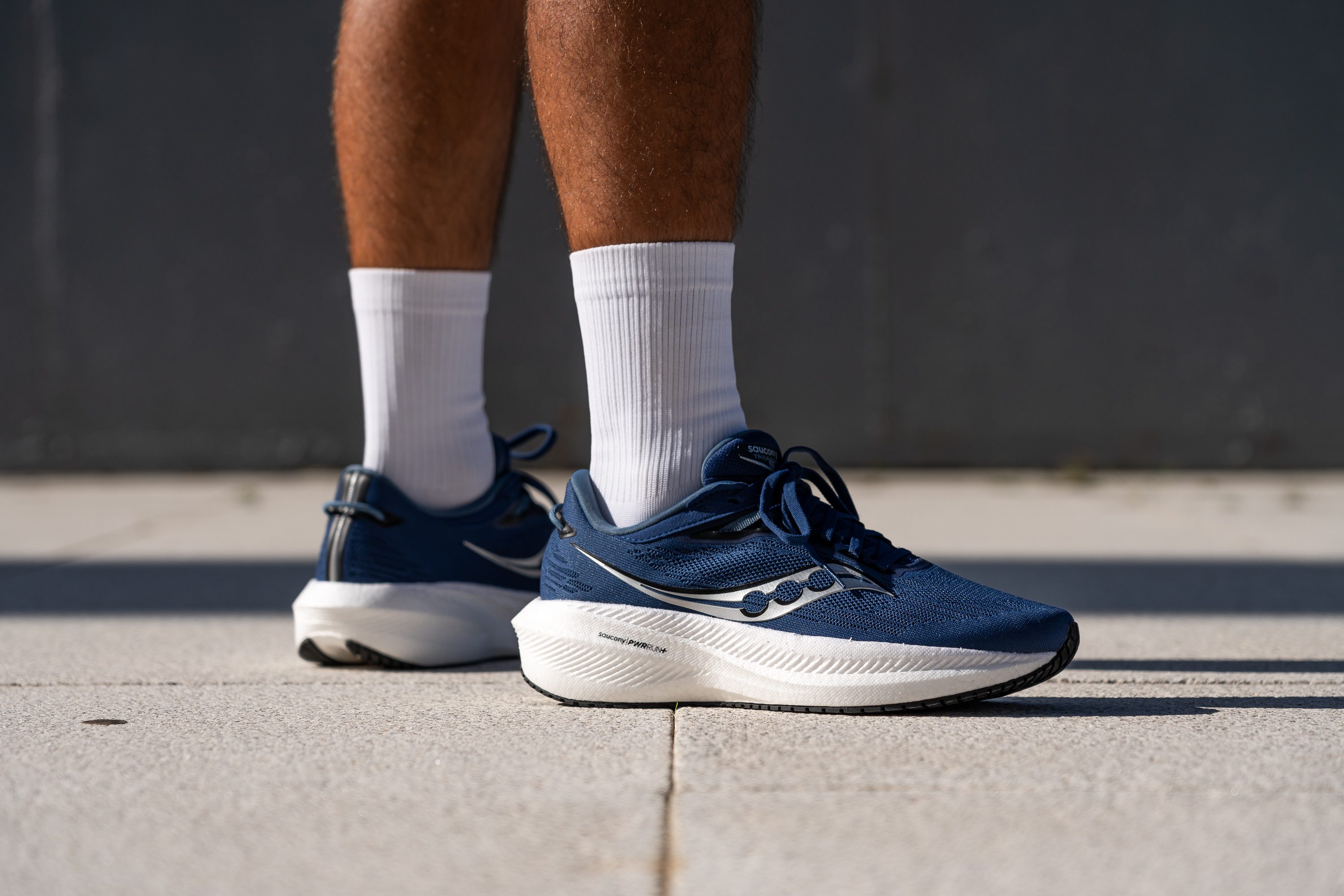
Who should NOT buy
The Saucony Triumph 21 excels as a jack-of-all-trades running shoe. However, for intervals or fast-paced training, it might fall short. Instead, consider the Saucony Endorphin Speed 3—it offers a plush ride but is 100% tailored for speed workouts.
For an alternative geared toward daily running, we also recommend trying the ASICS Novablast 3, as it delivers a great balance of comfort and performance.
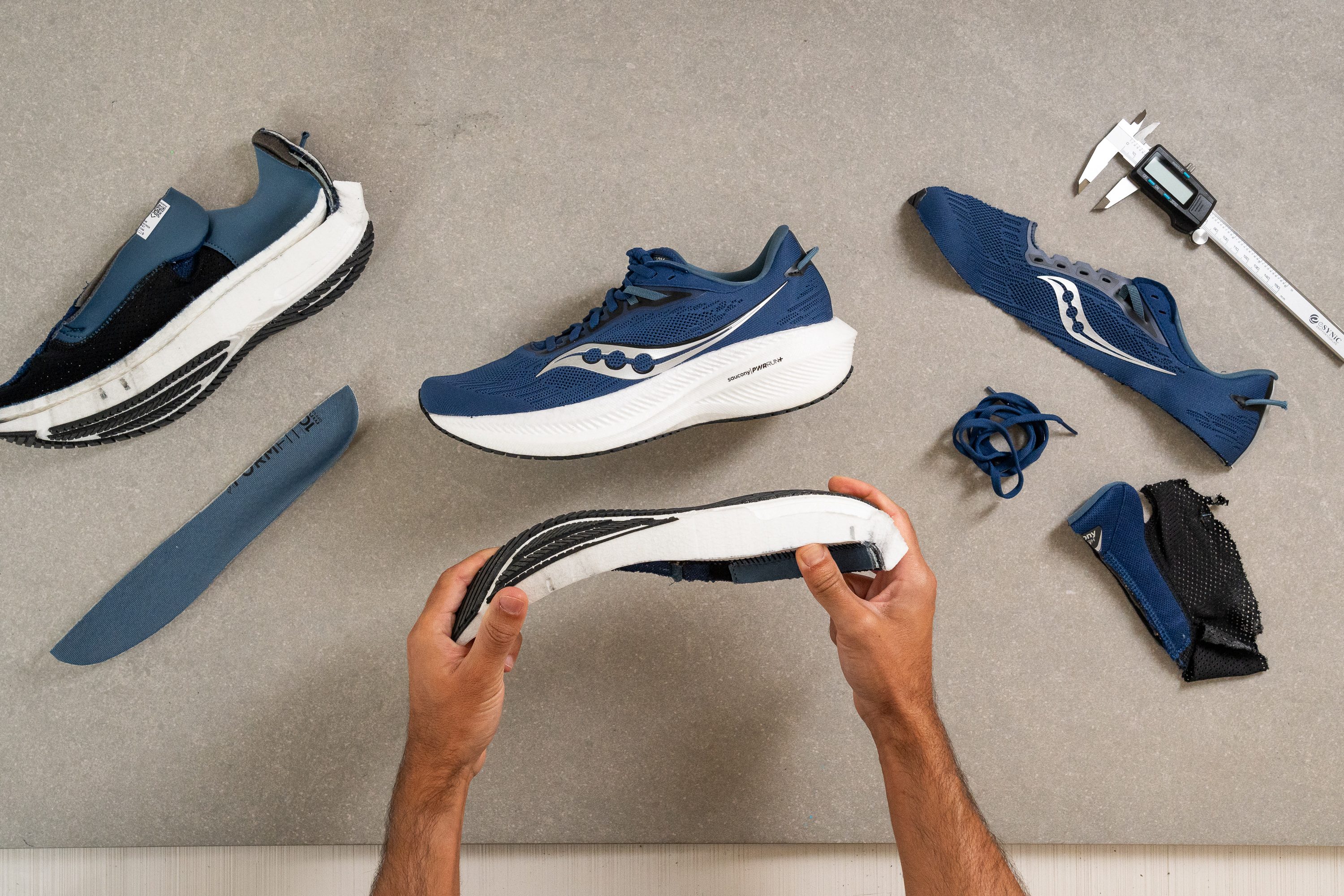
Runners with narrow feet might also want to explore other options. Shoes like the Nike Pegasus 40 or the Hoka Clifton 9 can provide a better fit in this particular situation.
Cushioning
Shock absorption
Most runners gravitate toward the Triumph because the Ride often feels undercushioned, and that makes sense. Indeed, we measured 134 SA in the Triumph 21, making it a better pick for long-haul comfort or heavier runners.
This plush setup adds serious underfoot protection, offering a more forgiving ride than its lighter sibling and helping absorb impact across extended miles.
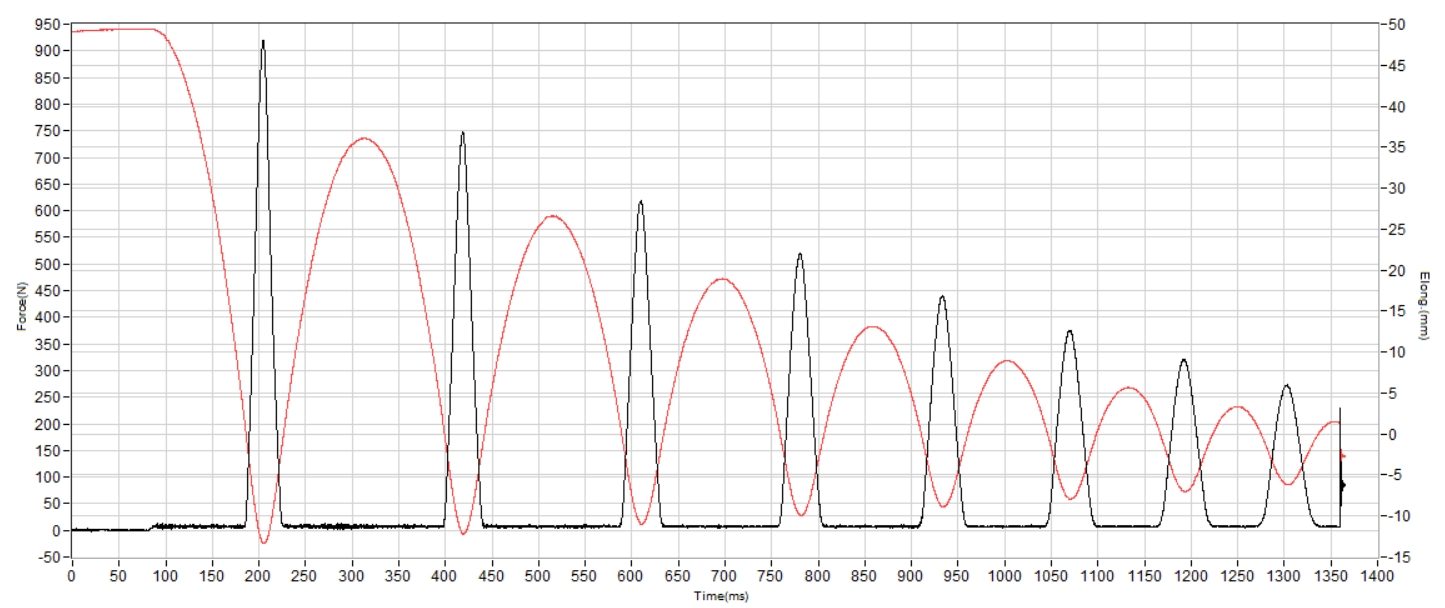
| Triumph 21 | 134 SA |
| Average | 130 SA |
Heel stack
Our admiration for the shoe's weight grew when we measured the heel stack in the lab.
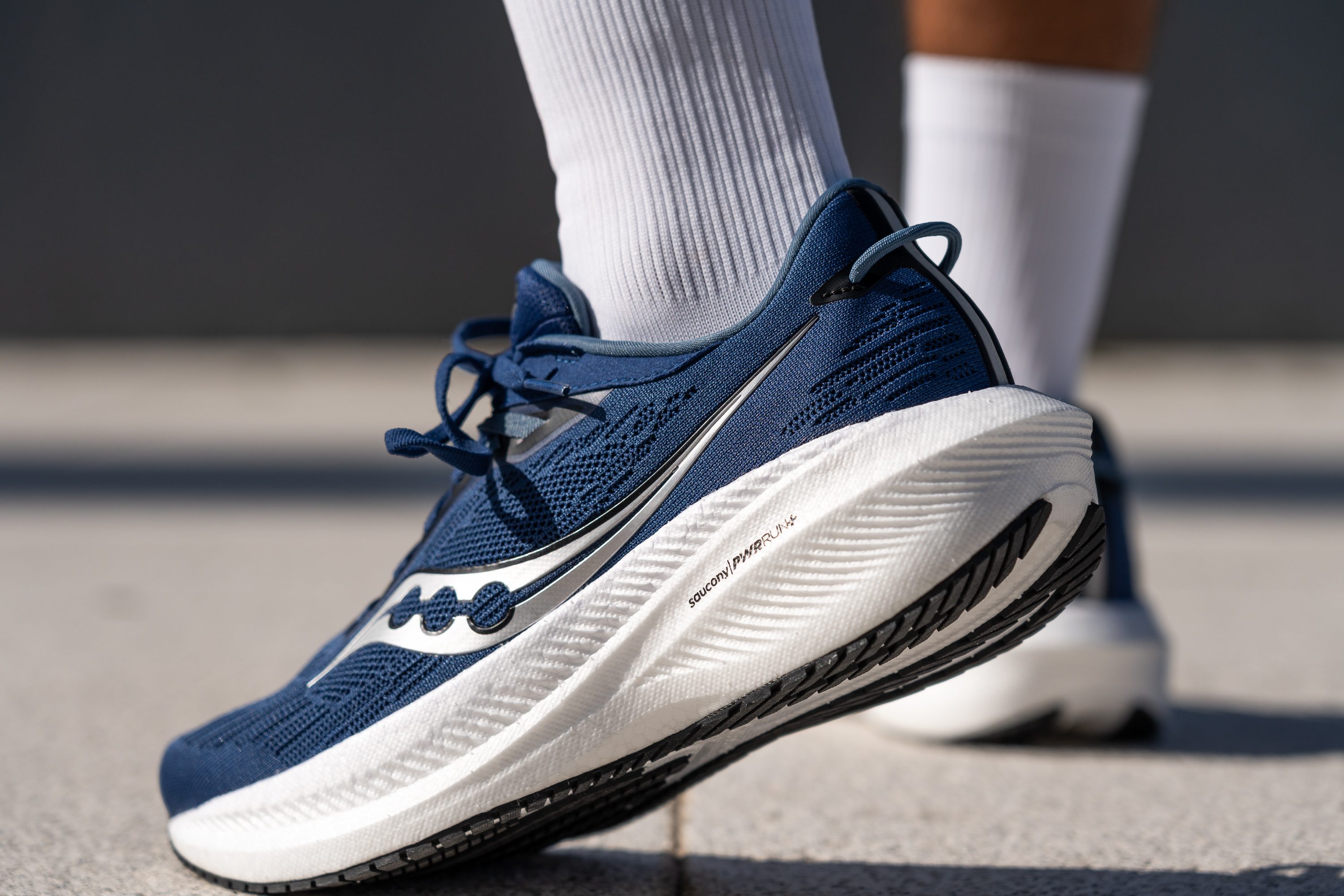
At 39.1 mm, we discovered that it ranks among the most cushioned daily trainers available. Now it stands proudly in the same category as super-thick shoes like the Nike Invincible 3.
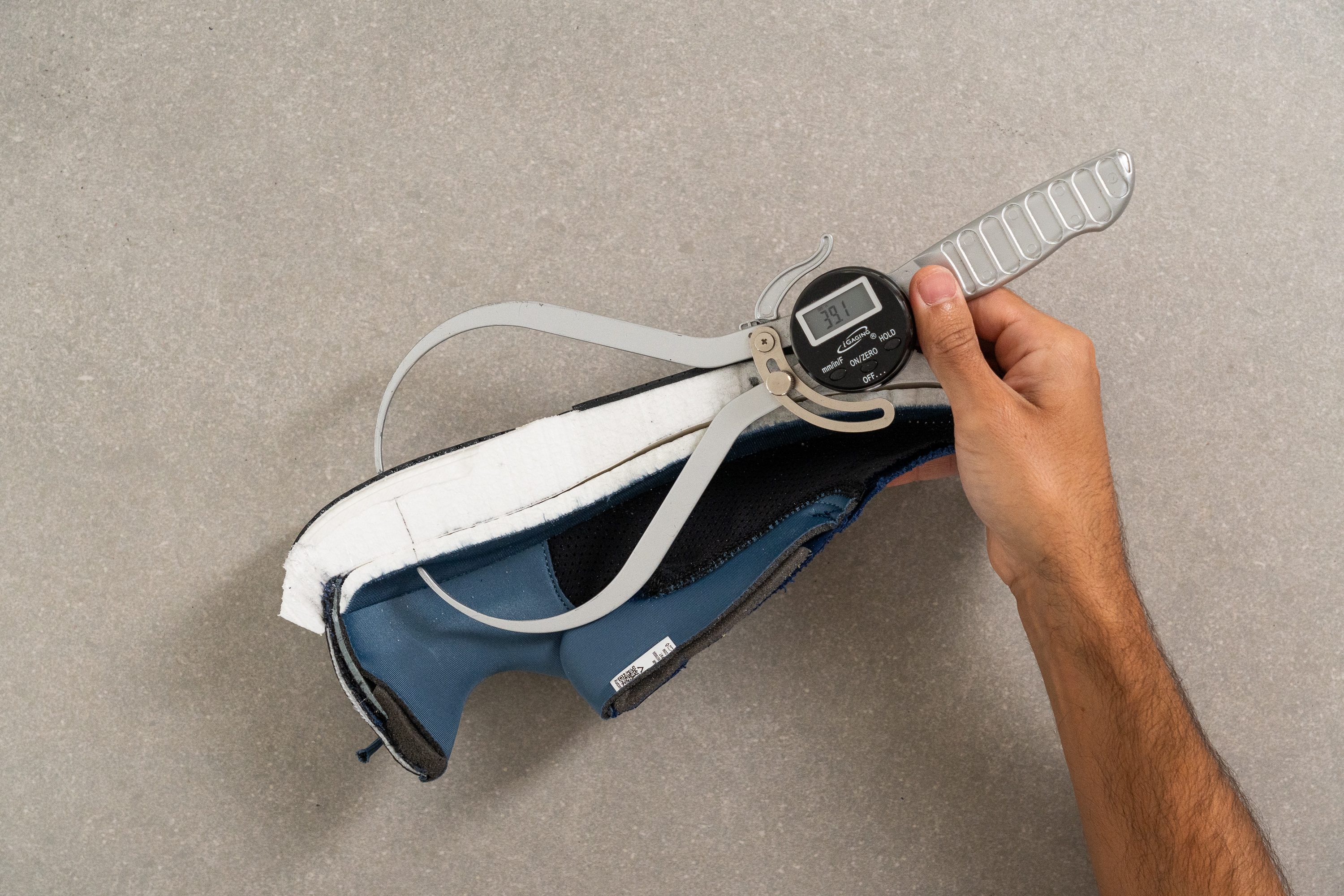
| Triumph 21 | 39.1 mm |
| Average | 34.8 mm |
Forefoot stack
We precisely measured the forefoot and found it to be 28.6 mm thick. This thickness ensures enough cushioning for every type of foot strike.
Additionally, it ensures near-zero ground feel, which, depending on the runner, can be seen as a benefit or a drawback.
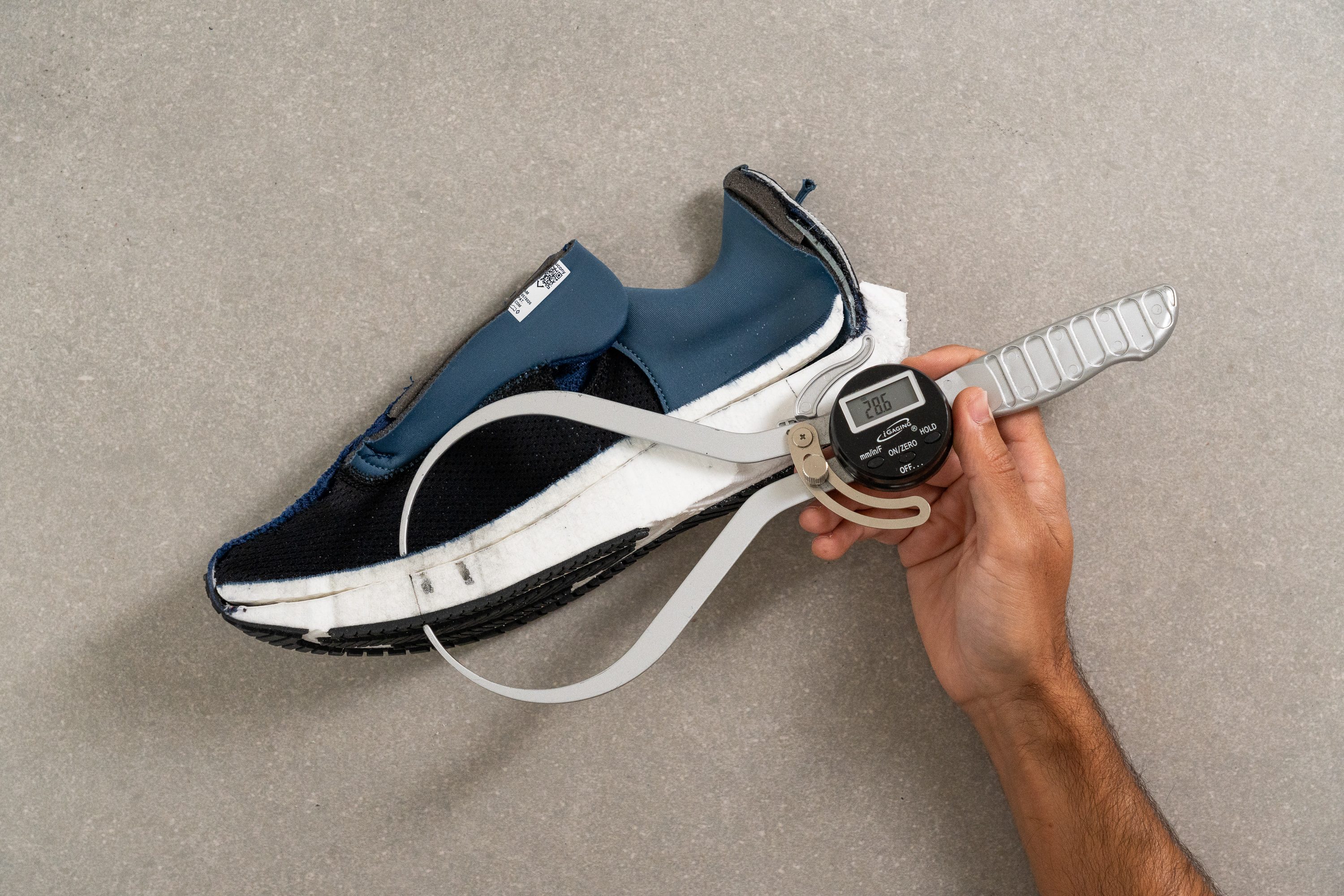
| Triumph 21 | 28.6 mm |
| Average | 26.2 mm |
Drop
When we measured the difference between the forefoot and the heel, we found a 10.5-mm heel-to-toe drop.
This makes the Triumph 21 an excellent choice for heel strikers, consistent with its previous versions.
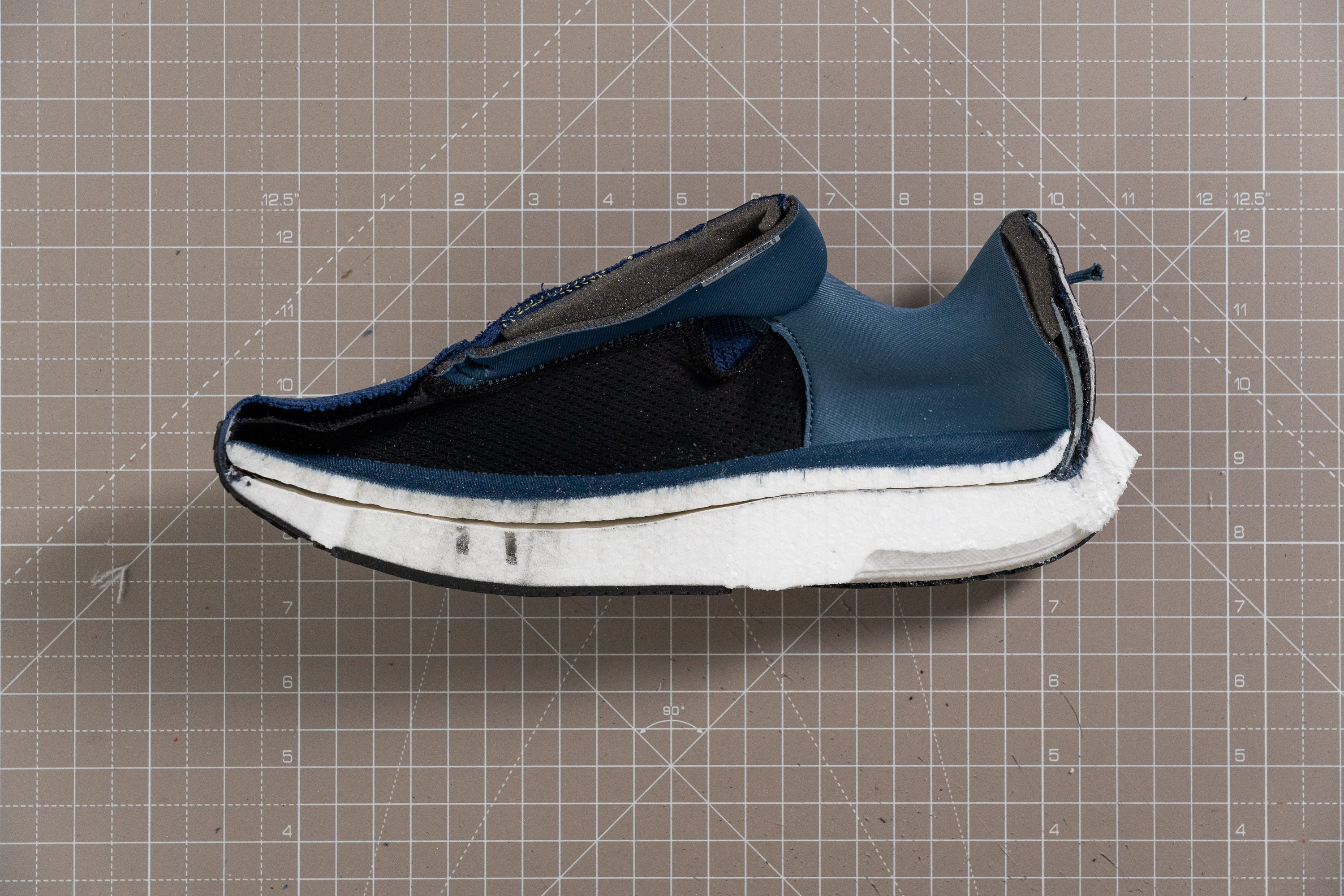
| Triumph 21 | 10.5 mm |
| Average | 8.6 mm |
Midsole softness
At RunRepeat's Lab, we simply have a passion for running shoe foams. So, when it came to testing the PWRRUN+ midsole of the Triumph 21, we were keen to use our durometer. We had a strong feeling that this would be the softest version yet, given the current trend in running shoes.
Our hunch was right. We measured it at 16.8 HA, making it a truly plush foam. To put it in perspective, the Triumph 19 was measured at 18.8 HA and the Triumph 20 at 19.5 HA.
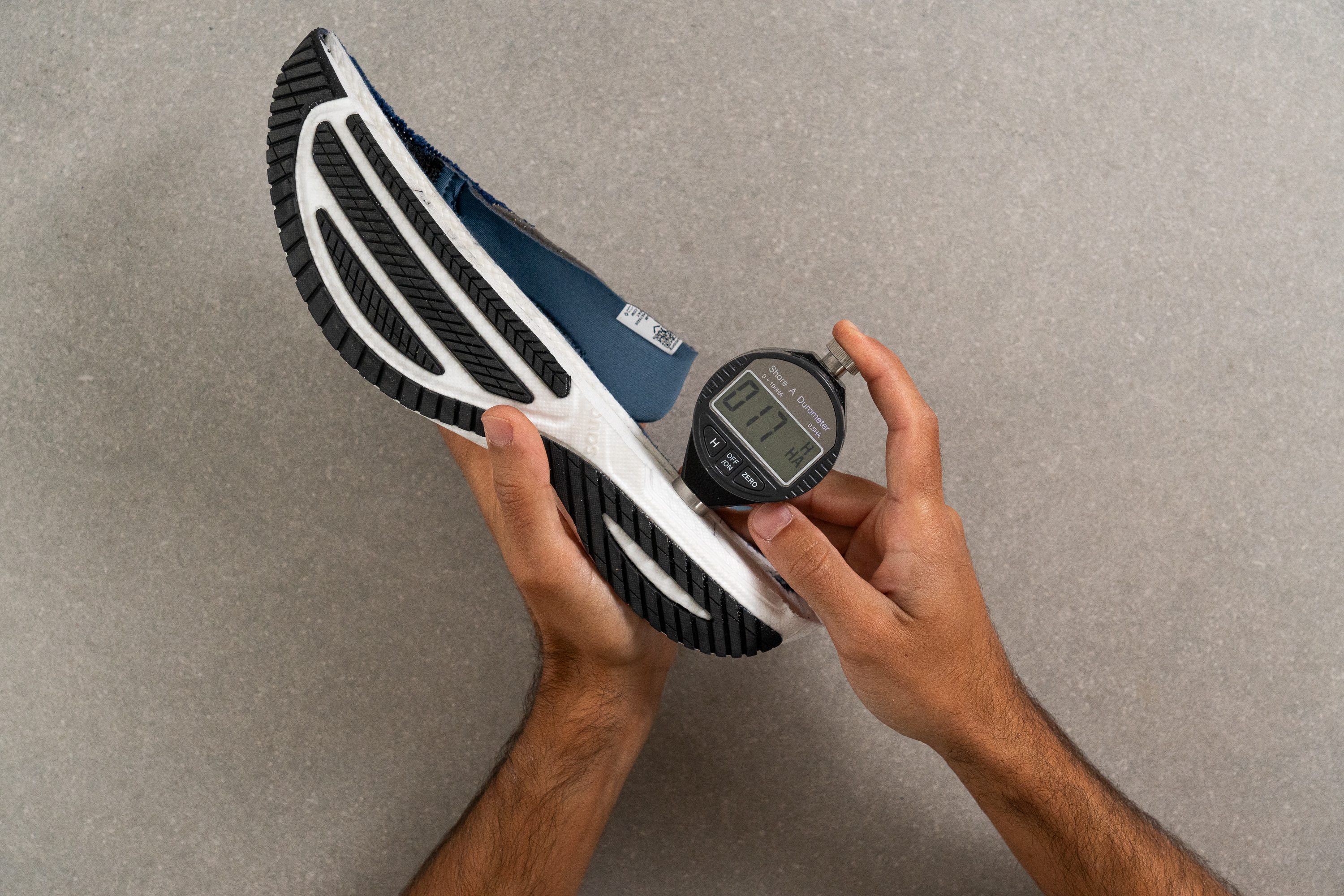
| Triumph 21 | 16.8 HA |
| Average | 20.4 HA |
Size and fit
Size
Saucony Triumph 21 fits true to size (62 votes).
Internal length
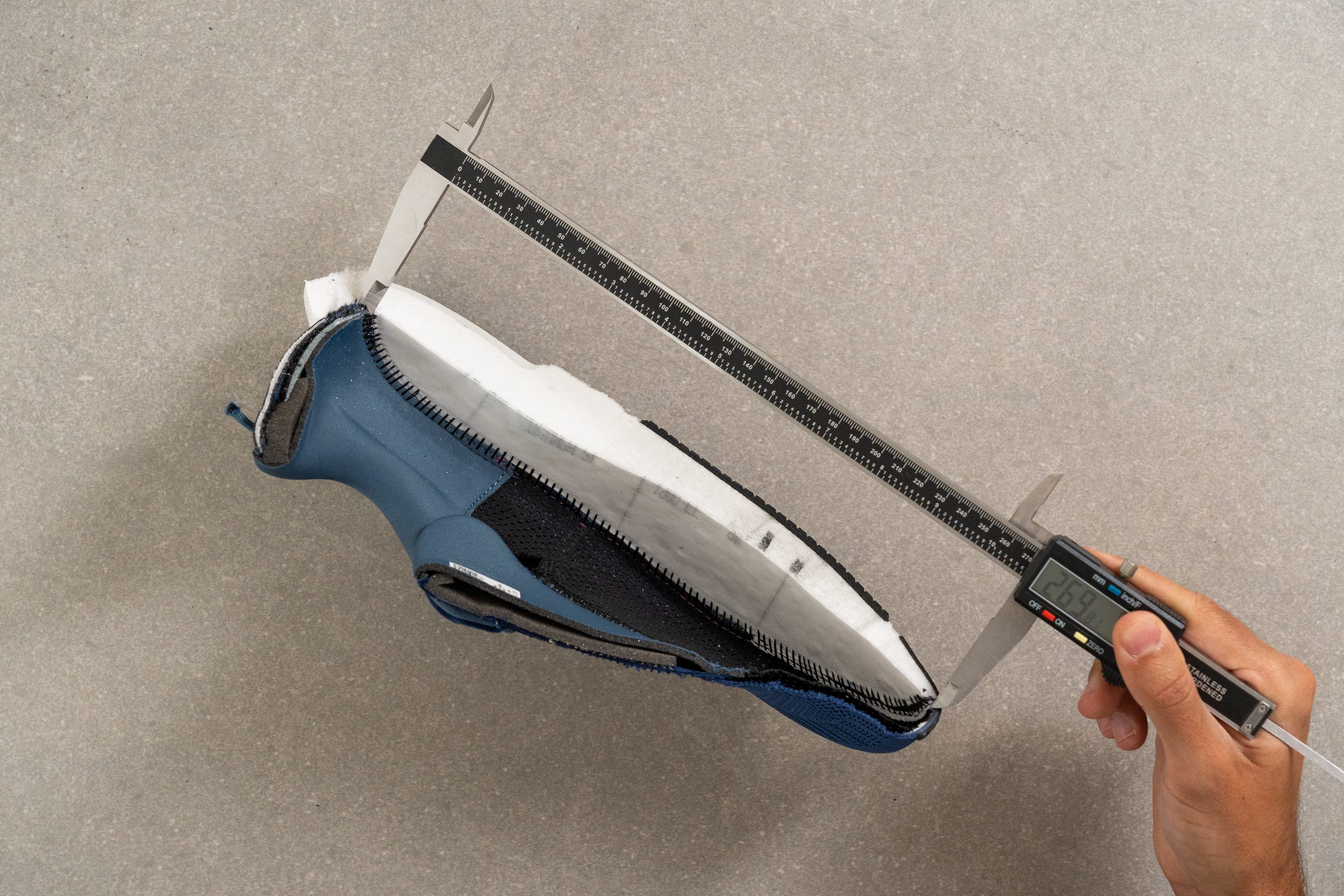
| Triumph 21 | 269.8 mm |
| Average | 269.4 mm |
Width / Fit
We measured the upper of the Triumph 21 by Saucony and found it to be quite roomy at 102.1 mm at its broadest point.
This design makes it suitable for those with wider feet, even in its standard-width size. However, it's worth noting that Saucony also offers this shoe in a Wide size for those who might require an even more spacious fit.
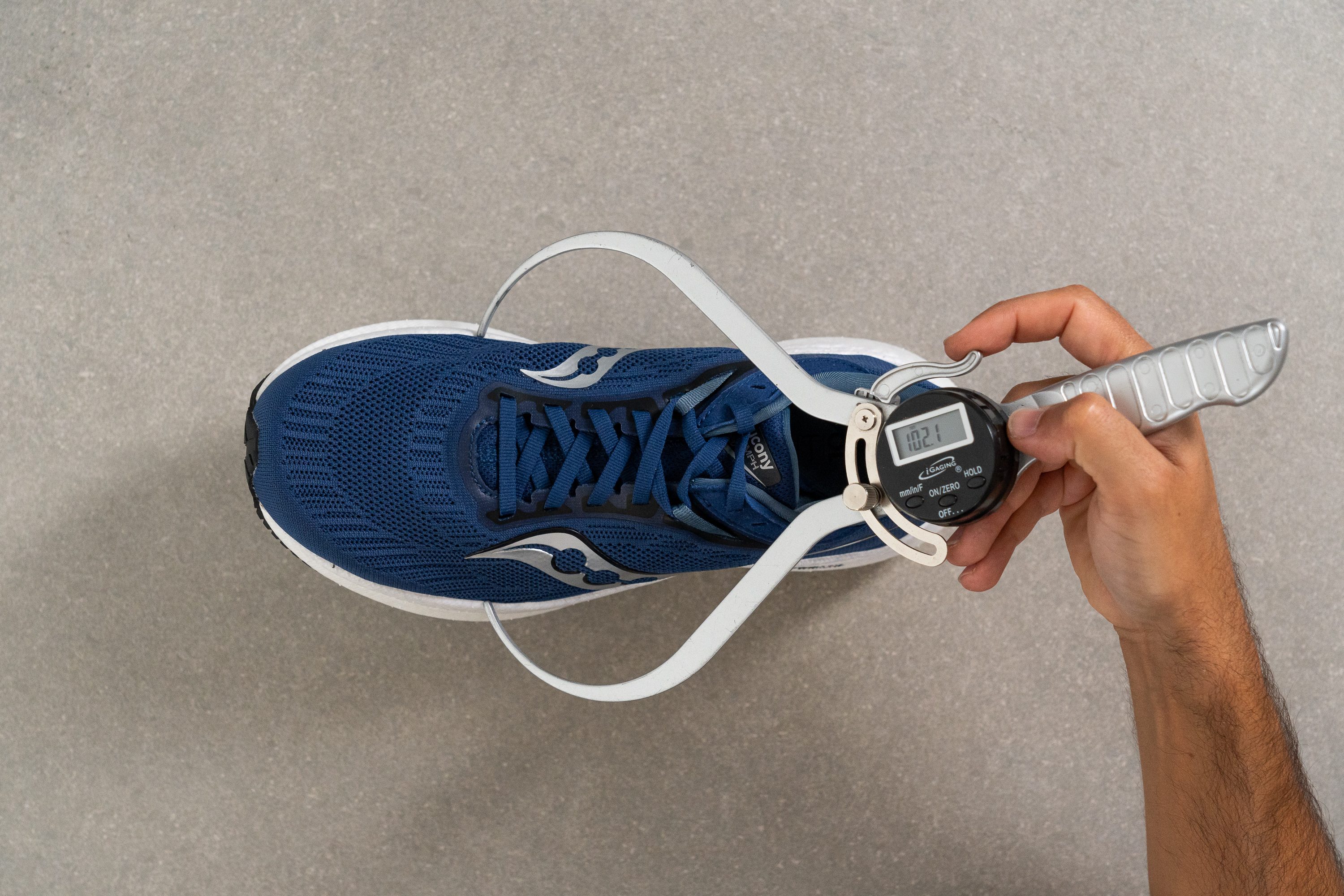
This test follows an older methodology, which is why you don't see recently tested shoes in the chart. Results from different methodologies can not be compared.
| Triumph 21 | 102.1 mm |
| Average | 98.5 mm |
Toebox width
The area for the big toe is also designed with a broad feet shape in mind. We measured this part too and found it to be 81.6 mm wide.
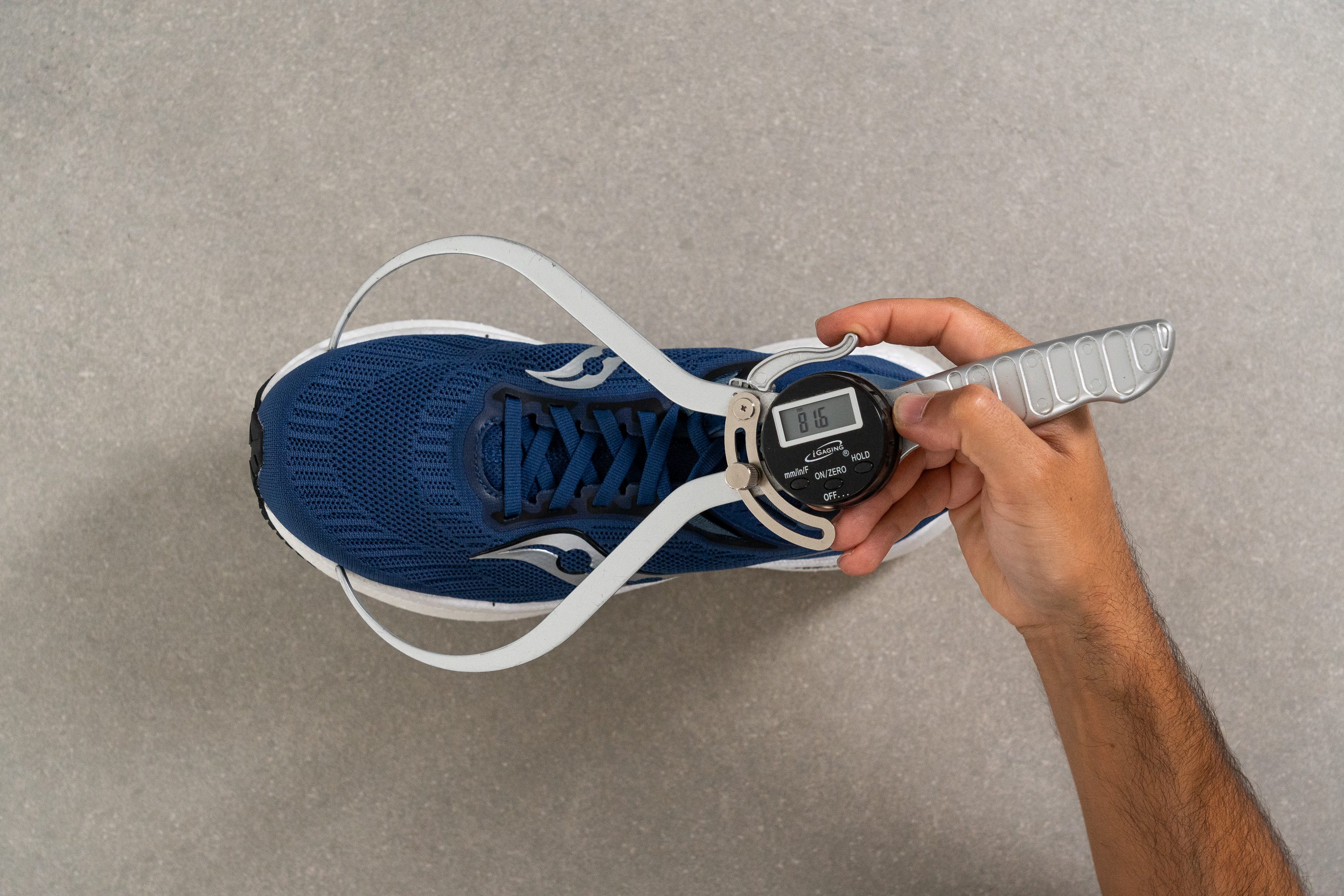
This test follows an older methodology, which is why you don't see recently tested shoes in the chart. Results from different methodologies can not be compared.
| Triumph 21 | 81.6 mm |
| Average | 78.4 mm |
Traction / Grip
Traction test
We tested this premium daily trainer using our custom SATRA TM144 setup and found a 0.43 score. While not groundbreaking, it lands in a respectable range compared to other competitors and shows that Saucony didn’t overlook wet-surface traction.
| Triumph 21 | 0.43 |
| Average | 0.49 |
Outsole design
For the Triumph 21, Saucony made a smart decision to avoid overly soft rubber. This was necessary because the outsole has multiple cutouts and areas with exposed foam, all in an effort to reduce the shoe's weight and improve flexibility.
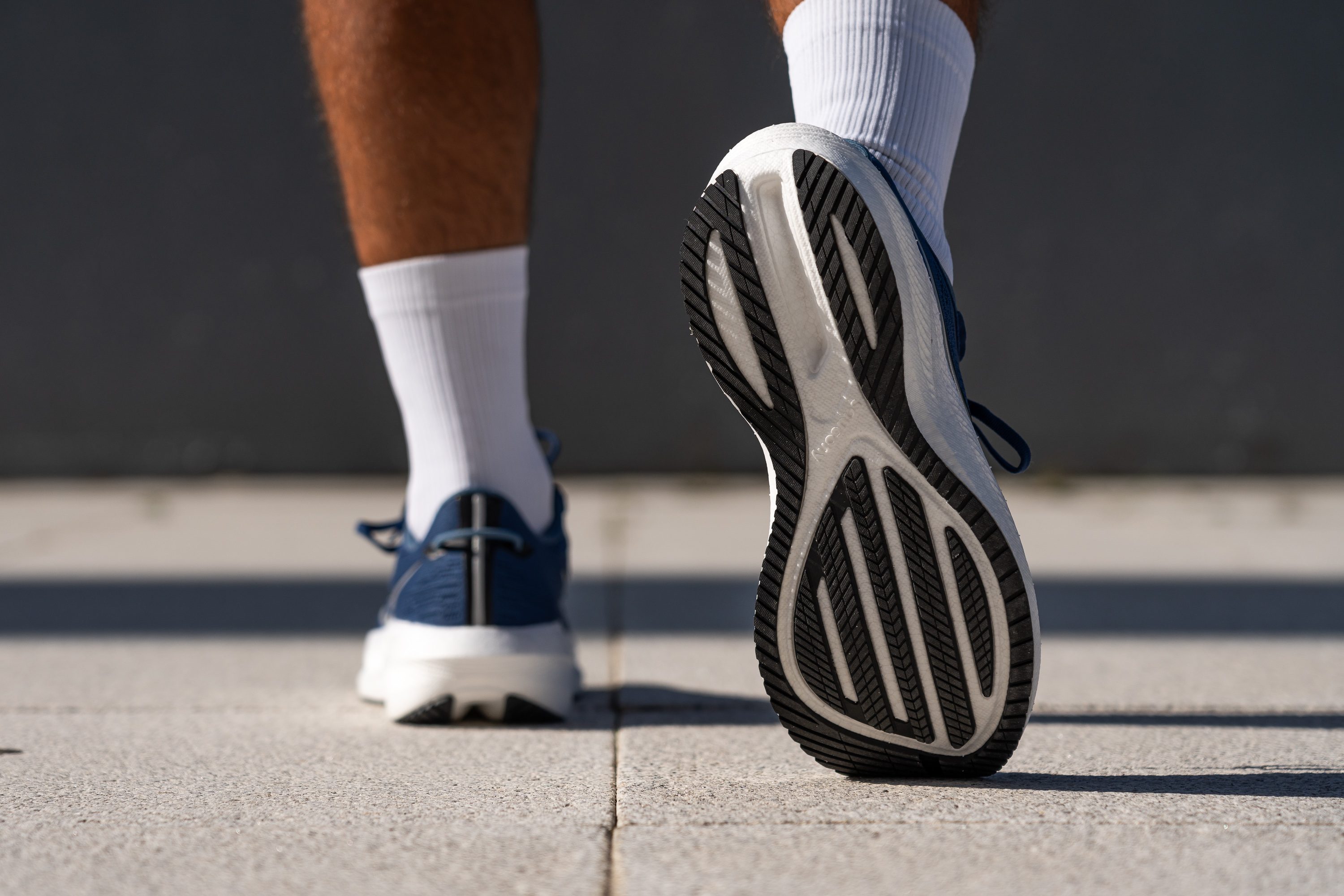
Flexibility / Stiffness
Comfort is essential for a shoe designed for daily running. Typically, this means a low score in the 30-degree bend test. We measured the Triumph 21 and it gave us a reading of 11.5N, which translates to a flexible shoe and seems just right to us.
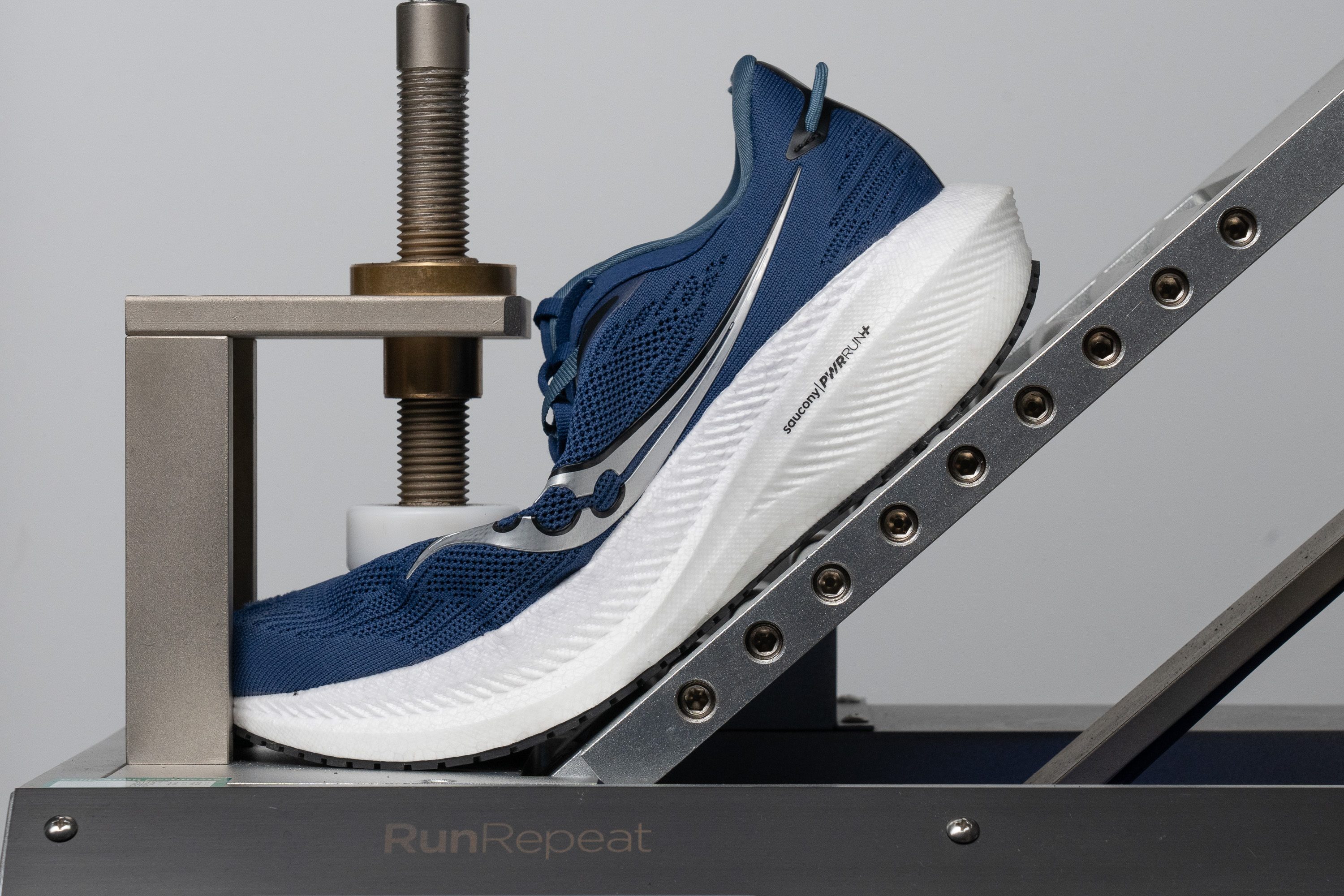
| Triumph 21 | 11.5N |
| Average | 15.3N |
Stiffness in cold (%)
After chilling the shoe in the freezer for 20 minutes and testing it again, we measured a result close to the previous one: 25.8N.
We measured a 17.4% difference, which stands out when compared to almost any other daily trainer.
Many shoes still use EVA foam—a more affordable material that doesn't perform as well in cold conditions. In contrast, Saucony uses TPU in their PWRRUN+ midsole. We've discovered that this material consistently performs well in colder temperatures.
| Triumph 21 | 17% |
| Average | 33% |
Weight
We've touched upon the outsole's role in the shoe's weight-reduction strategy—and the results are in! The Triumph 21 impressively tips the scales below the 10 oz benchmark.
At just 9.95 oz (282g), this is a standout weight for a plush daily trainer.
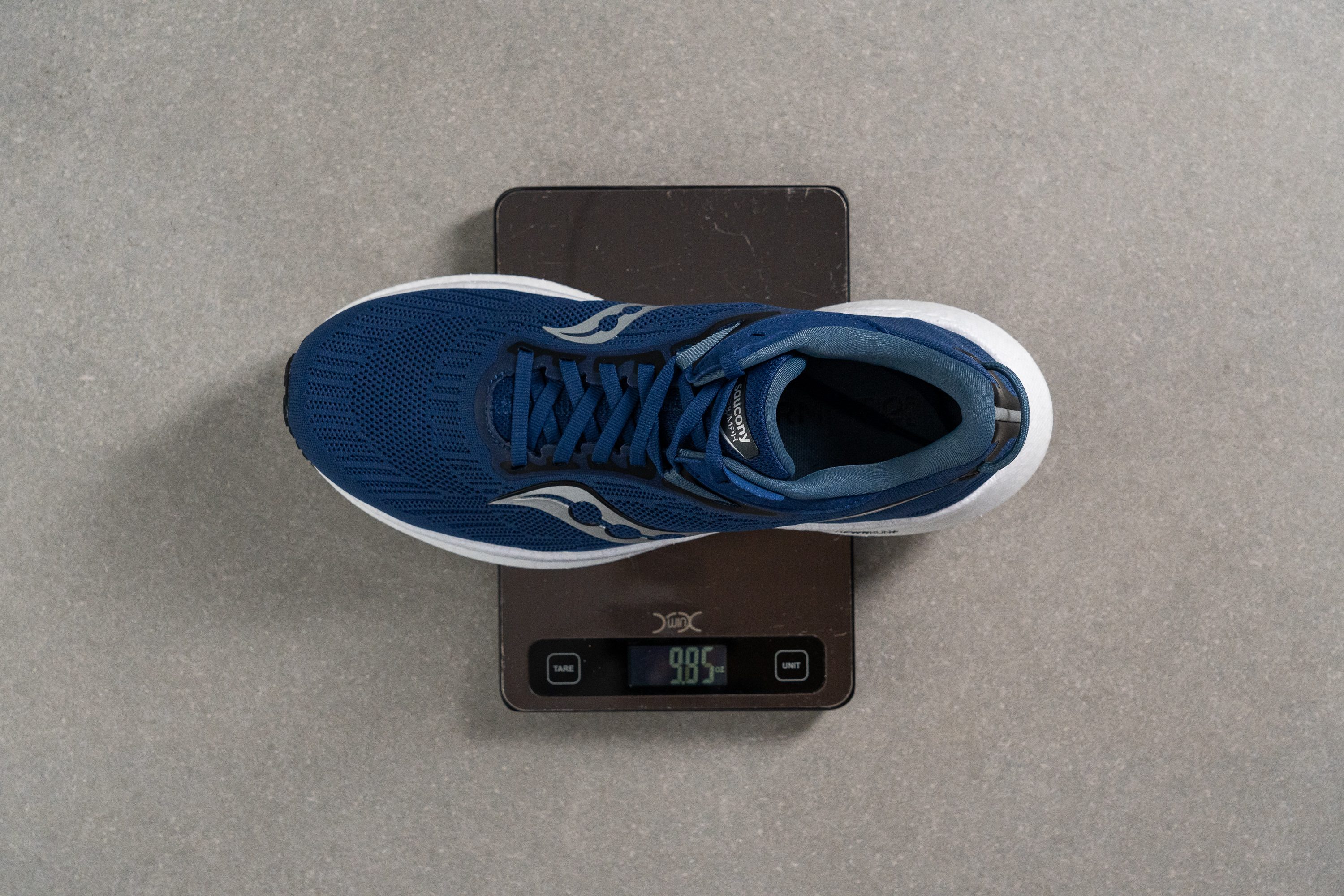
| Triumph 21 | 9.9 oz (282g) |
| Average | 9.3 oz (264g) |
Breathability
The Saucony Triumph series has consistently excelled in breathability, and the 21st edition upholds this tradition. In our lab's smoke-pumping test, we awarded it a score of 4/5. This score guarantees sufficient ventilation, even on hotter days.
During our light test, we clearly saw the impressive airflow. The way the light passed through the ventilation holes Saucony incorporated was notable. We especially appreciated that airflow was present throughout the whole shoe—not just in the toe box, which is common in most shoes.
However, it was our examination under the microscope that gave us a closer look at the shoe's design.

Here, we discovered a thick knit upper. Typically, this design enhances comfort but can reduce breathability.
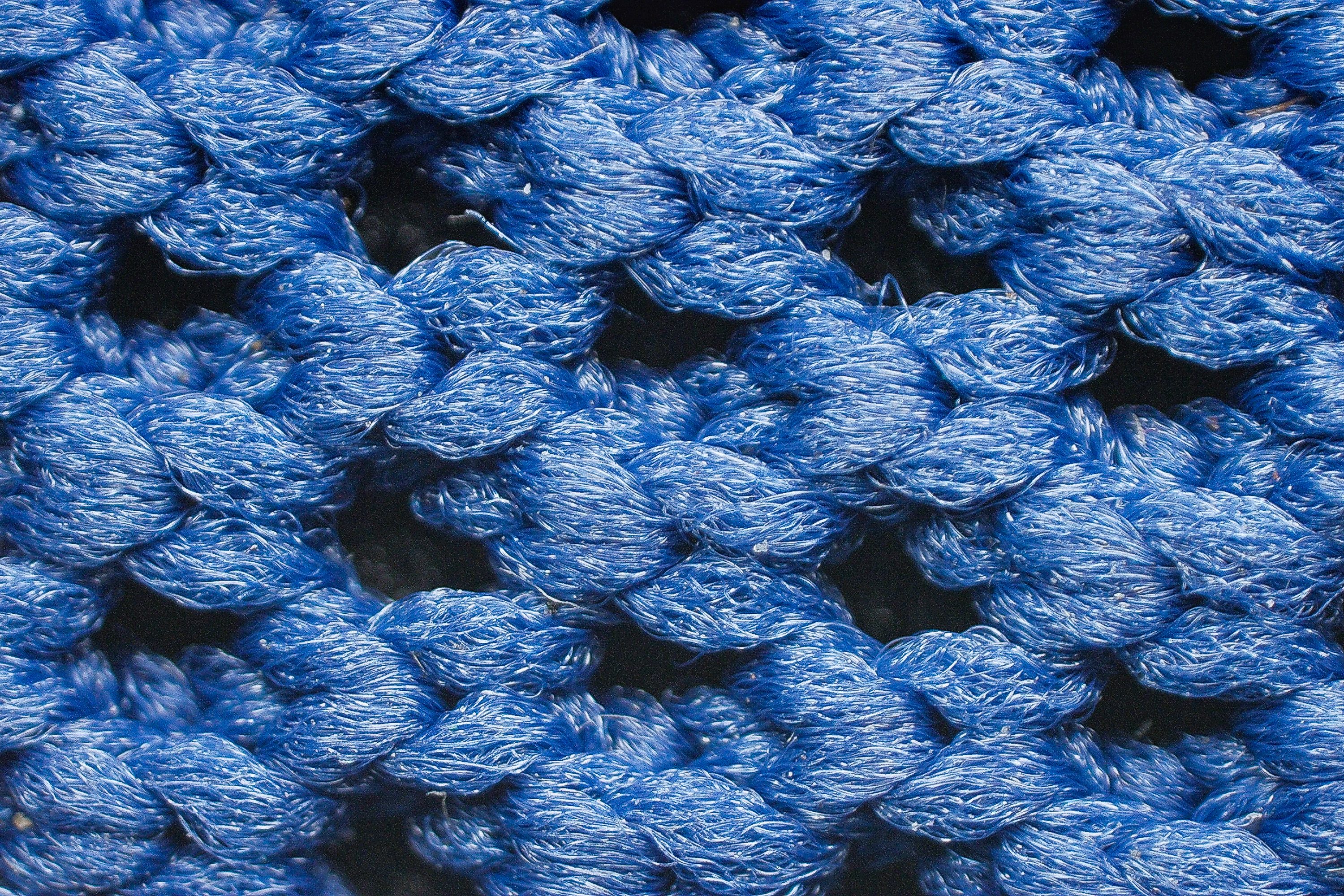
This explains why, despite the numerous ventilation holes, the shoe didn't earn a 5-out-of-5 score.
| Triumph 21 | 4 |
| Average | 3.7 |
Stability
Lateral stability test
The Saucony Triumph 21 is a neutral running shoe, lacking specific stability features. However, we've always found the series to offer moderate stability. This characteristic persists in the current edition.
Torsional rigidity
A primary reason the Triumph 21 feels more stable than one might expect is its significant torsional rigidity—unlike many daily trainers. In fact, we awarded it a 4/5 score, a rating often reserved for plated shoes.
| Triumph 21 | 4 |
| Average | 3.5 |
Heel counter stiffness
Saucony's designers used the same strategy with the heel counter. As a result, we awarded it the same 4/5 rating.
This approach enhances stability, but it might compromise comfort for runners who favor a softer heel counter.
| Triumph 21 | 4 |
| Average | 2.9 |
Midsole width - forefoot
Saucony's approach to enhancing stability in a subtle manner is evident in the increased midsole width. They went with a wider design, with the shoe boasting an impressive 118.1 mm in the forefoot.
This design guarantees smooth and stable landings for both neutral runners and mild pronators.
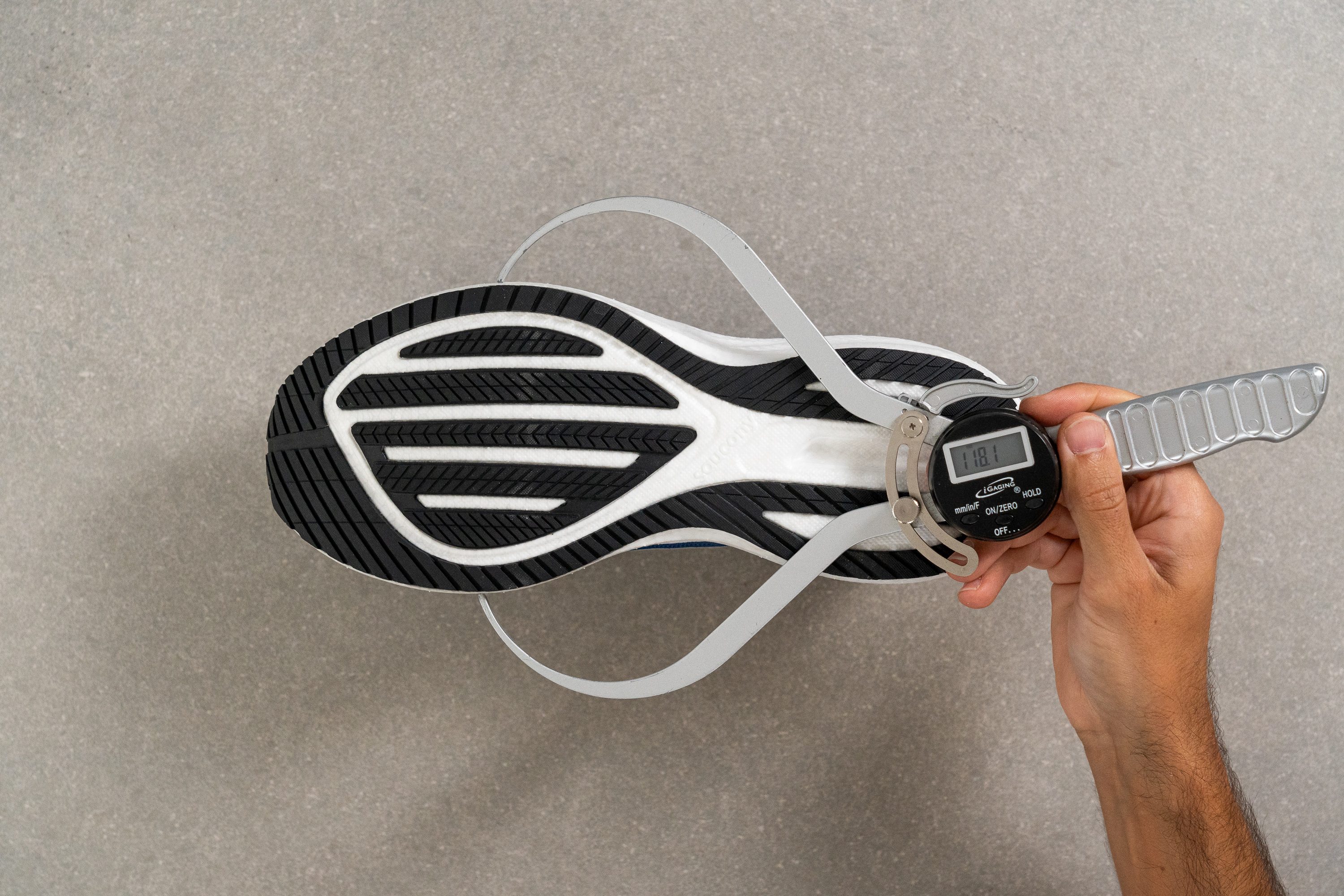
| Triumph 21 | 118.1 mm |
| Average | 114.4 mm |
Midsole width - heel
With a heel width of 91.3 mm, we found it to be right in line with the average.
The width is just right for a daily trainer; if it were any broader, this shoe might overshadow other stability shoes in Saucony's lineup.
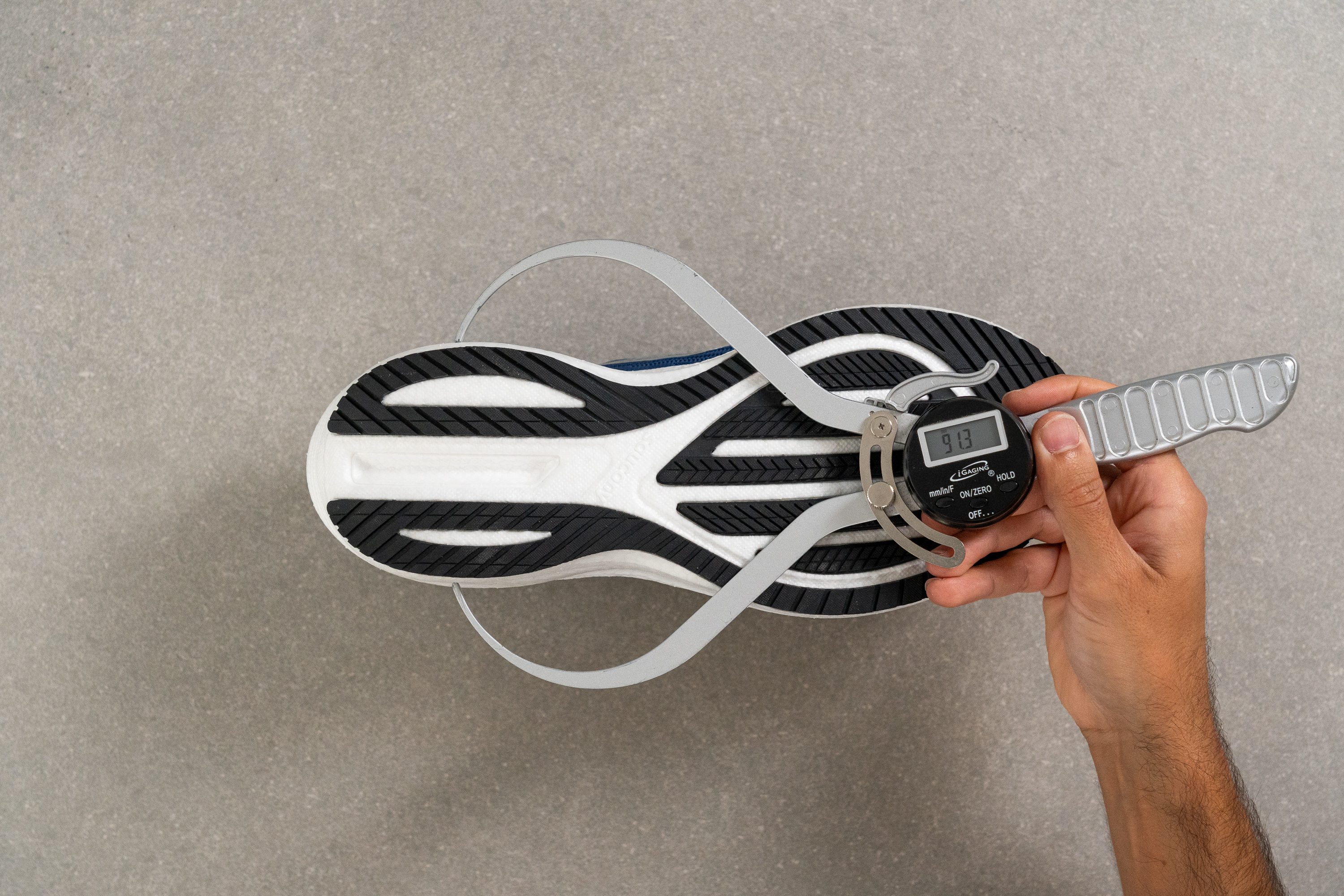
| Triumph 21 | 91.3 mm |
| Average | 90.6 mm |
Durability
Toebox durability
From the moment we first held the shoe, we were immediately impressed, sensing its potential for outstanding durability. However, the real test was subjecting the upper to our Dremel.
Upon doing so, our initial hunch was validated. We were happy to give it a 3/5 score, which is significantly above average. It outperformed the ASICS GT 1000 12 by a noticeable margin as you can see below.
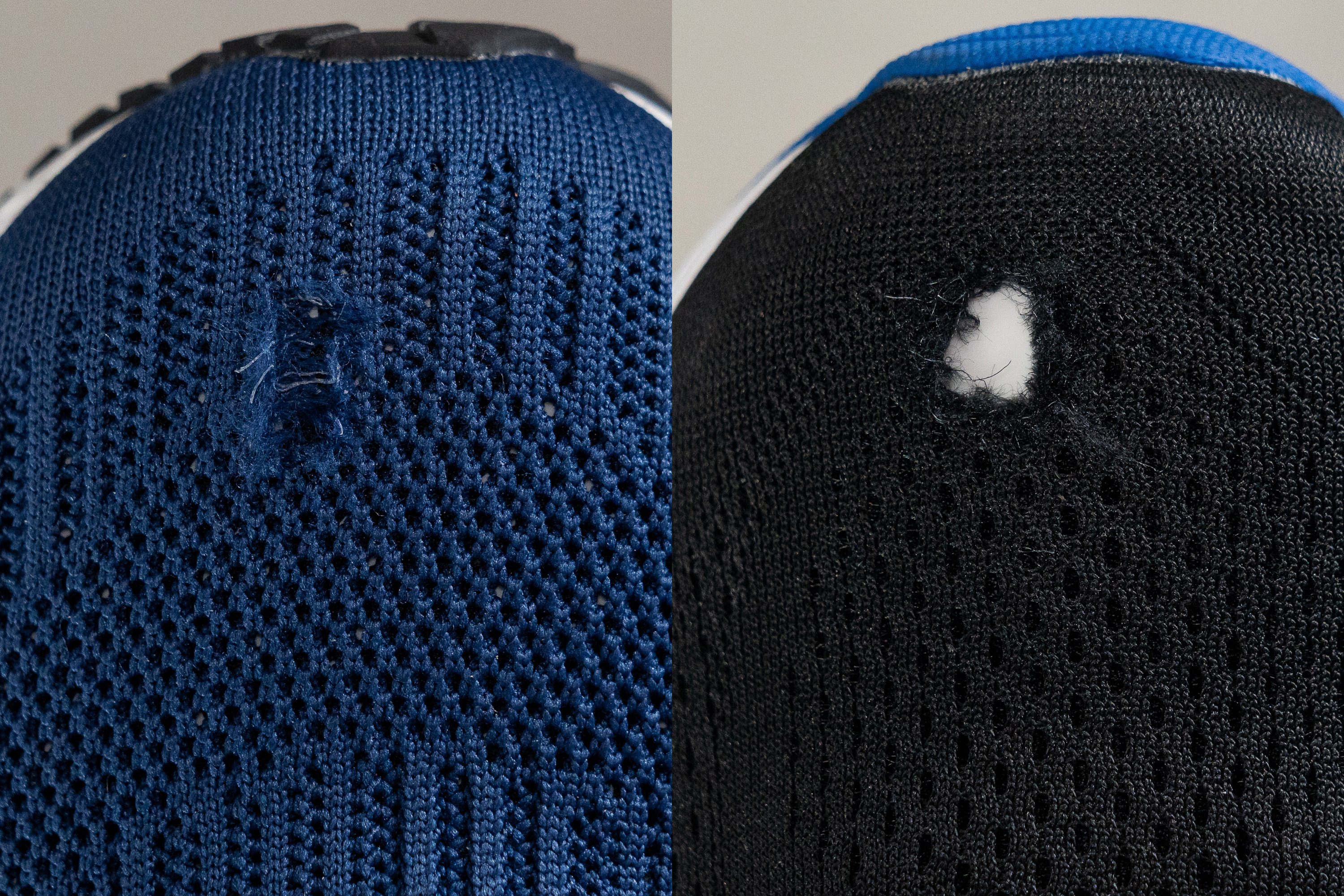
| Triumph 21 | 3 |
| Average | 2.6 |
Heel padding durability
The fabric in the heel area felt more robust than what we've encountered in most other shoes. This gave us the impression that we were testing a contender for one of the most durable daily trainers on the market.
In our lab test, we discovered that the Triumph 21 indeed stood out. It secured a 3/5 score, surpassing many of its rivals. While at first glance this might seem like just an average score, it's important to note that most shoes only manage to achieve a 1/5 in the same assessment.
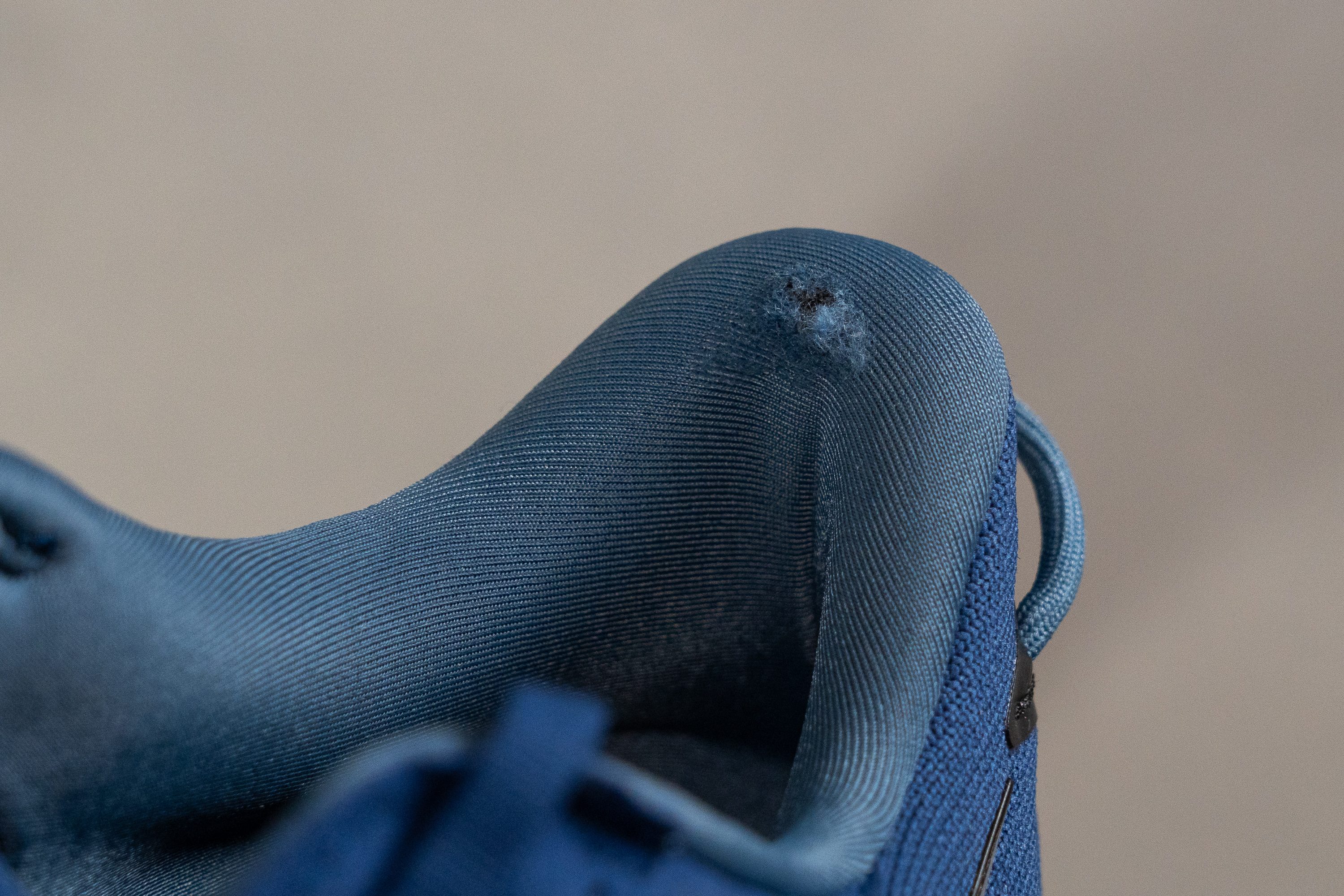
| Triumph 21 | 3 |
| Average | 3.4 |
Outsole durability
We employed the Dremel once more to gauge the outsole's durability. The tool left an indentation measuring 0.7 mm.
It's clear to us that the Triumph 21 is a long-lasting shoe.
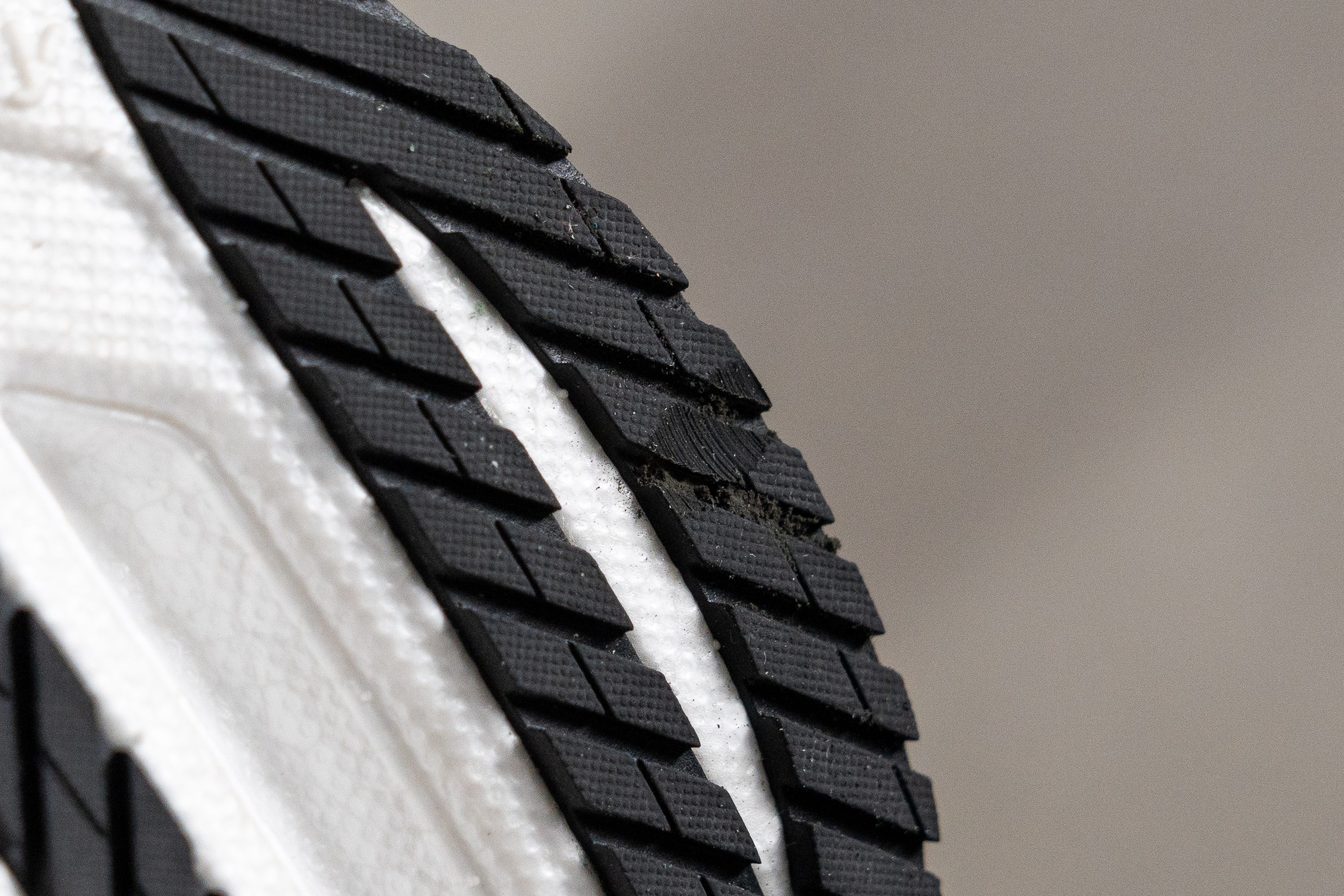
| Triumph 21 | 0.7 mm |
| Average | 1.1 mm |
Outsole thickness
We measured the outsole at 2.9 mm, making it slimmer than what's found on most shoes.
We're confident that Saucony thoroughly tested numerous outsole variations in the lab. They determined that there wasn't a need for a thicker design, which helped in saving weight.
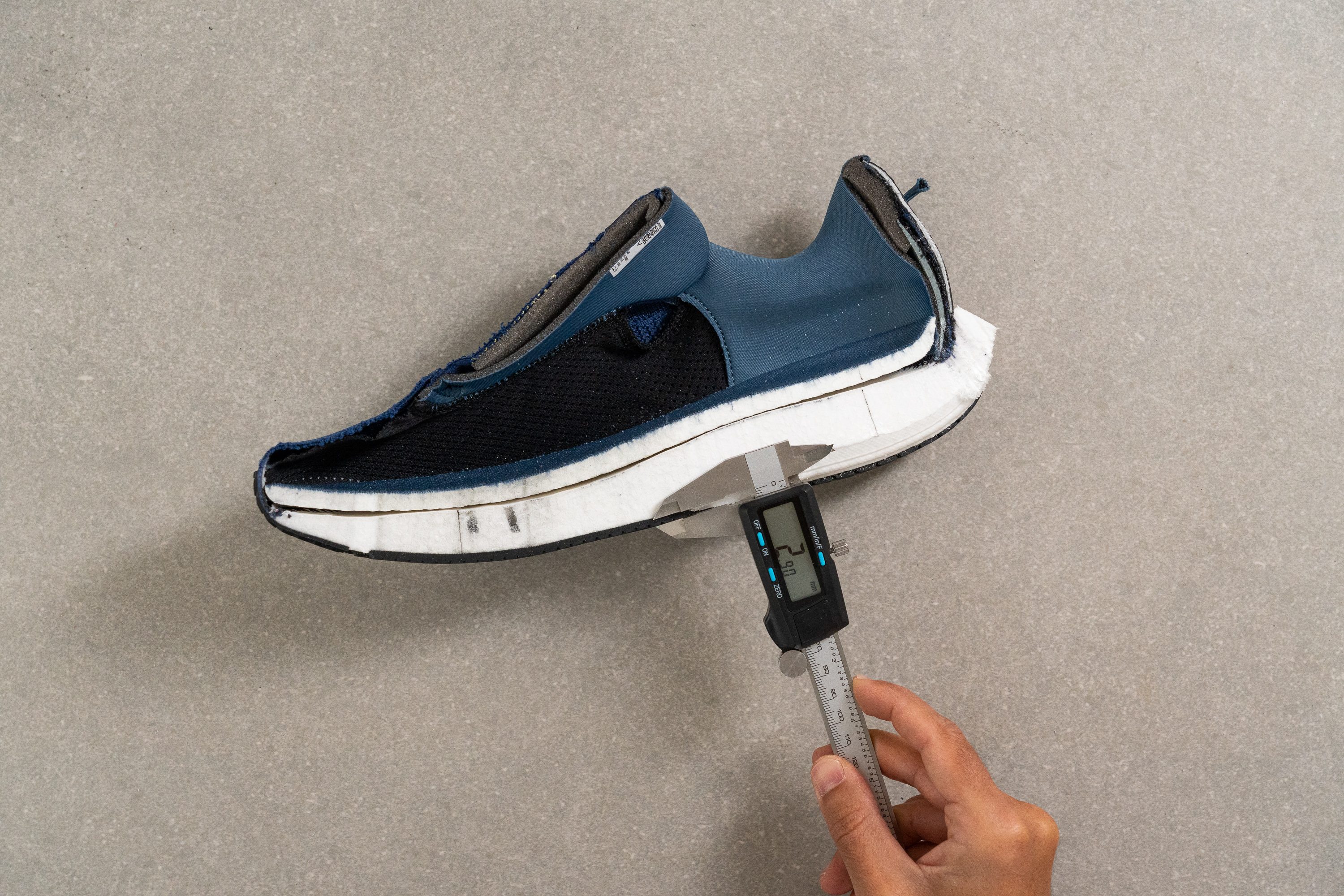
| Triumph 21 | 2.9 mm |
| Average | 3.2 mm |
Misc
Insole thickness
We measured the insole to be 6.7 mm thick, and we found it to be incredibly comfortable because it's made of the same PWRRUN+ foam used in the midsole. You can be assured of comfort no matter how long you plan to run in these shoes.
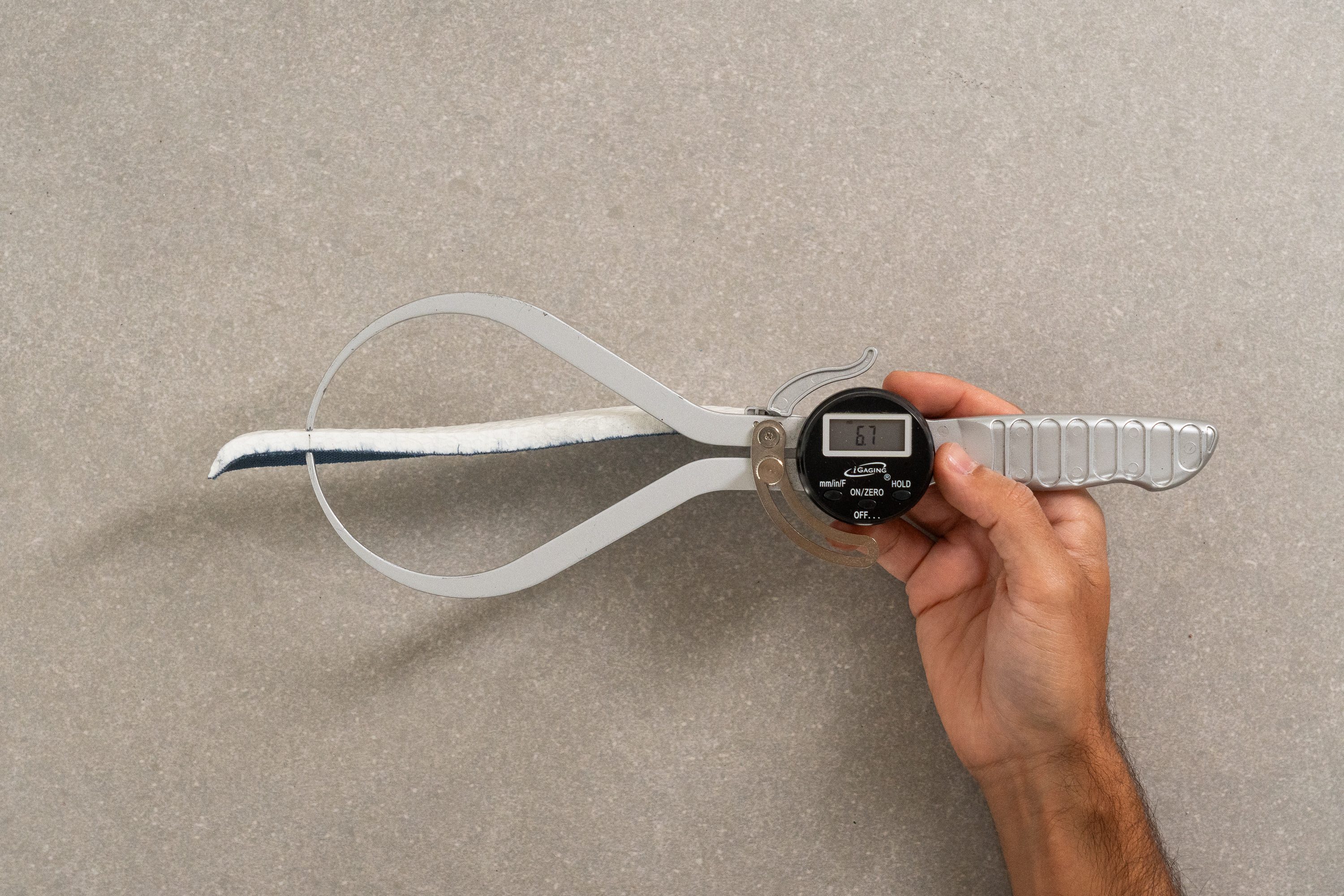
| Triumph 21 | 6.7 mm |
| Average | 4.5 mm |
Removable insole
The insole isn't glued, allowing us to easily swap it with custom orthotics or different insoles from other shoes.
However, as we said before, this shoe's insole shares its composition with the midsole: TPU-based PWRRUN+. If you opt to replace it, be mindful that you're parting with some valuable cushioning. It's something to think about!
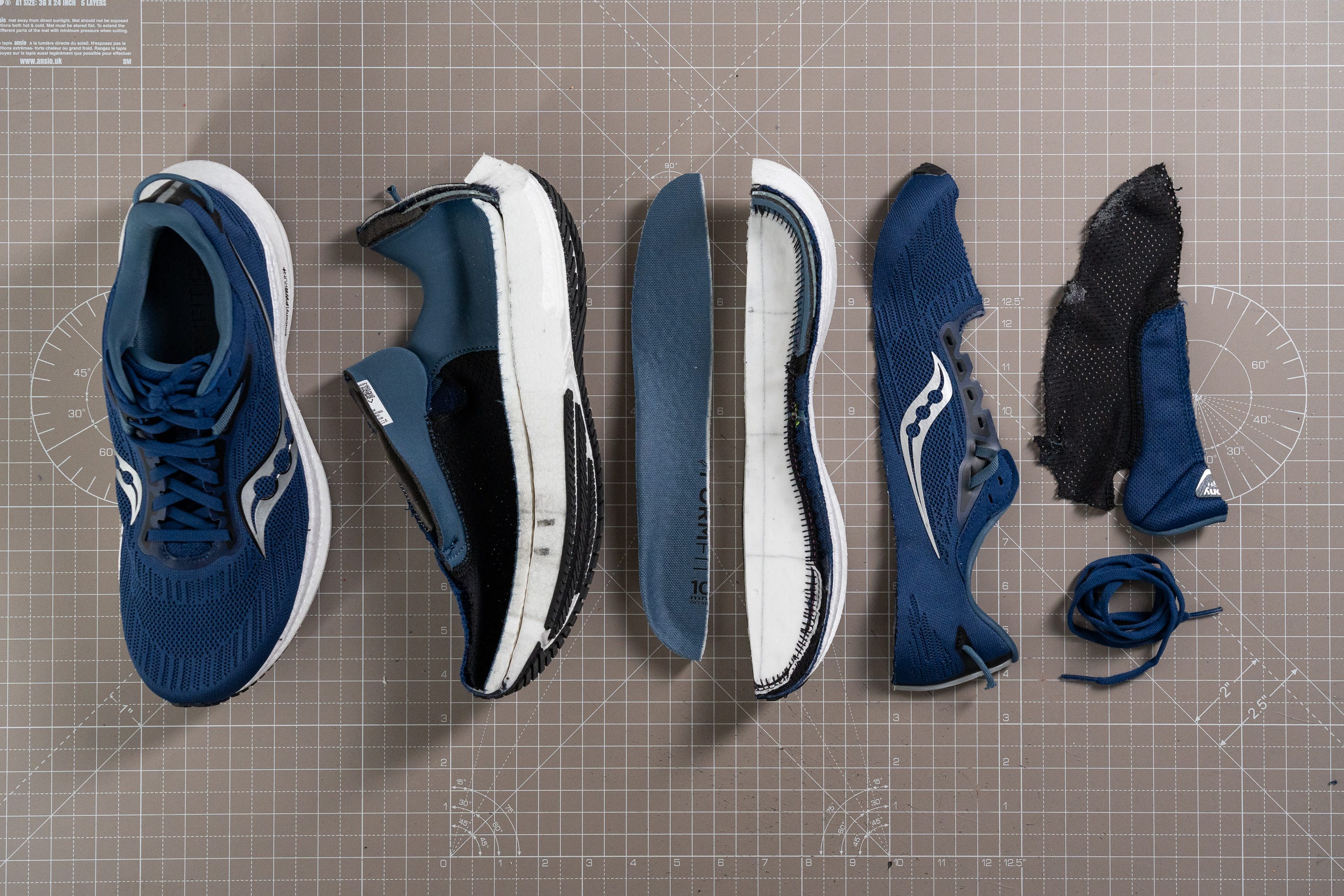
| Triumph 21 | Yes |
Midsole softness in cold (%)
After 20 minutes in our freezer, we measured the PWRRUN+ foam at 21.6 HA using our durometer in the lab. It still felt plush.
We discovered that there's a 28.6% change, which is a great result for a daily trainer. It shows that TPU foams like PWRRUN+ are superior to their EVA counterparts.
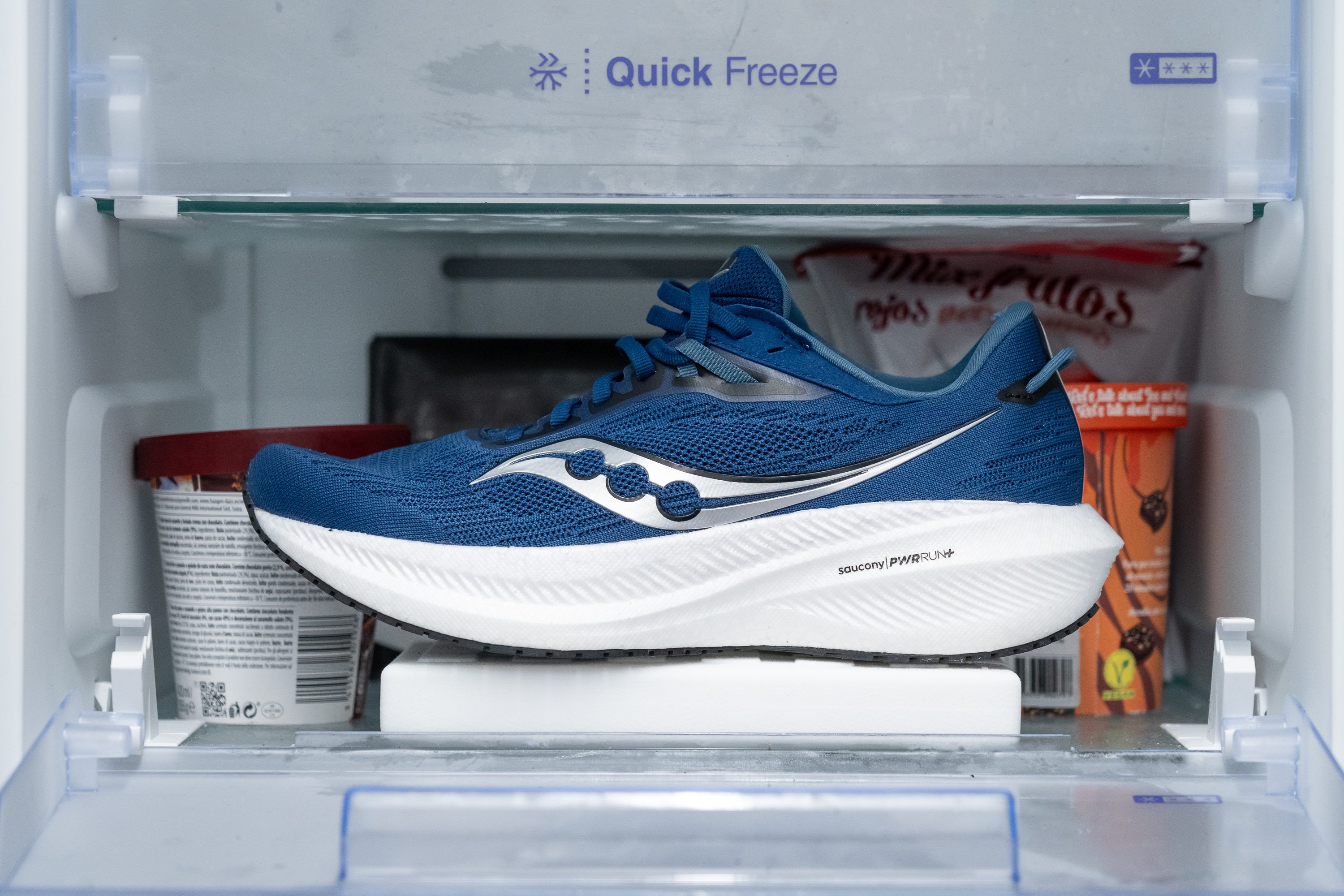
| Triumph 21 | 29% |
| Average | 24% |
Reflective elements
Kudos to Saucony! In a world where reflective elements are often overlooked to reduce costs, we truly value these two strips they've added in the heel.
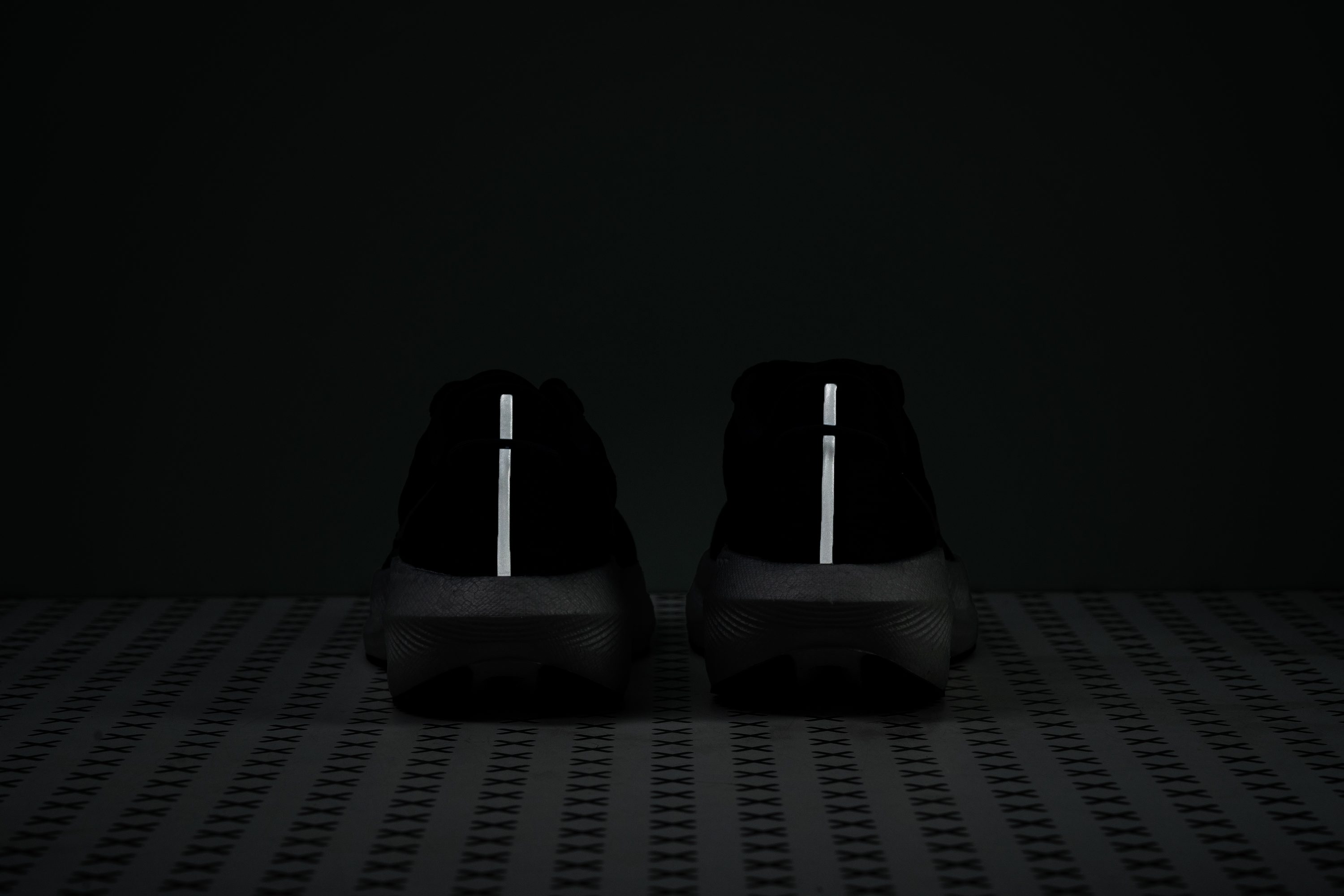
| Triumph 21 | Yes |
Tongue padding
In our lab analysis of the tongue, we turned our attention to the padding—crucial for comfort to prevent issues like lace bite.
We discovered that Saucony added two layers of padding inside the tongue, which together measure a total of 7.6 mm.
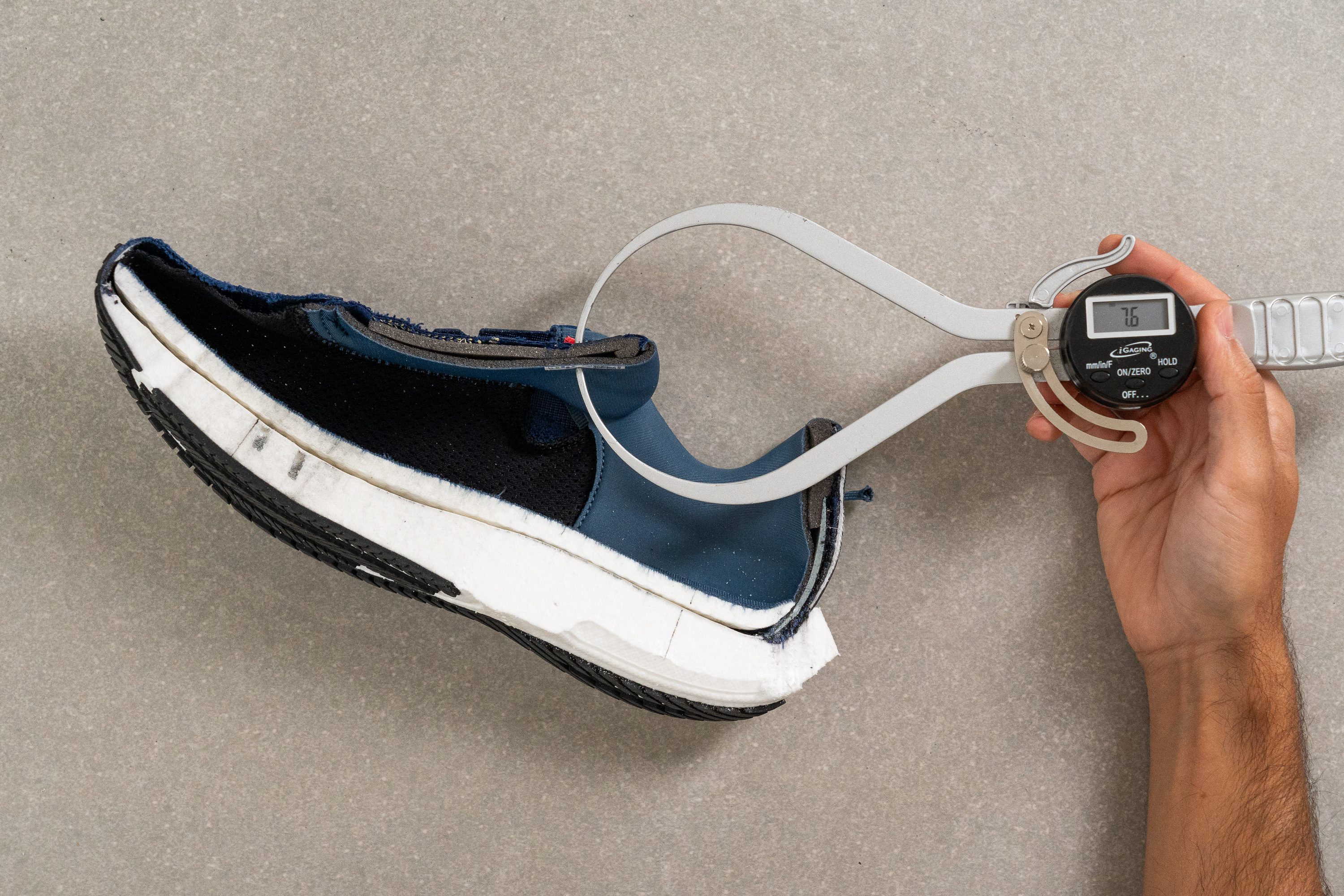
| Triumph 21 | 7.6 mm |
| Average | 5.7 mm |
Tongue: gusset type
The tongue provides an excellent lockdown with its bootie-style gusset. It's non-intrusive and offered our feet comfort, which is essential for a daily running shoe.
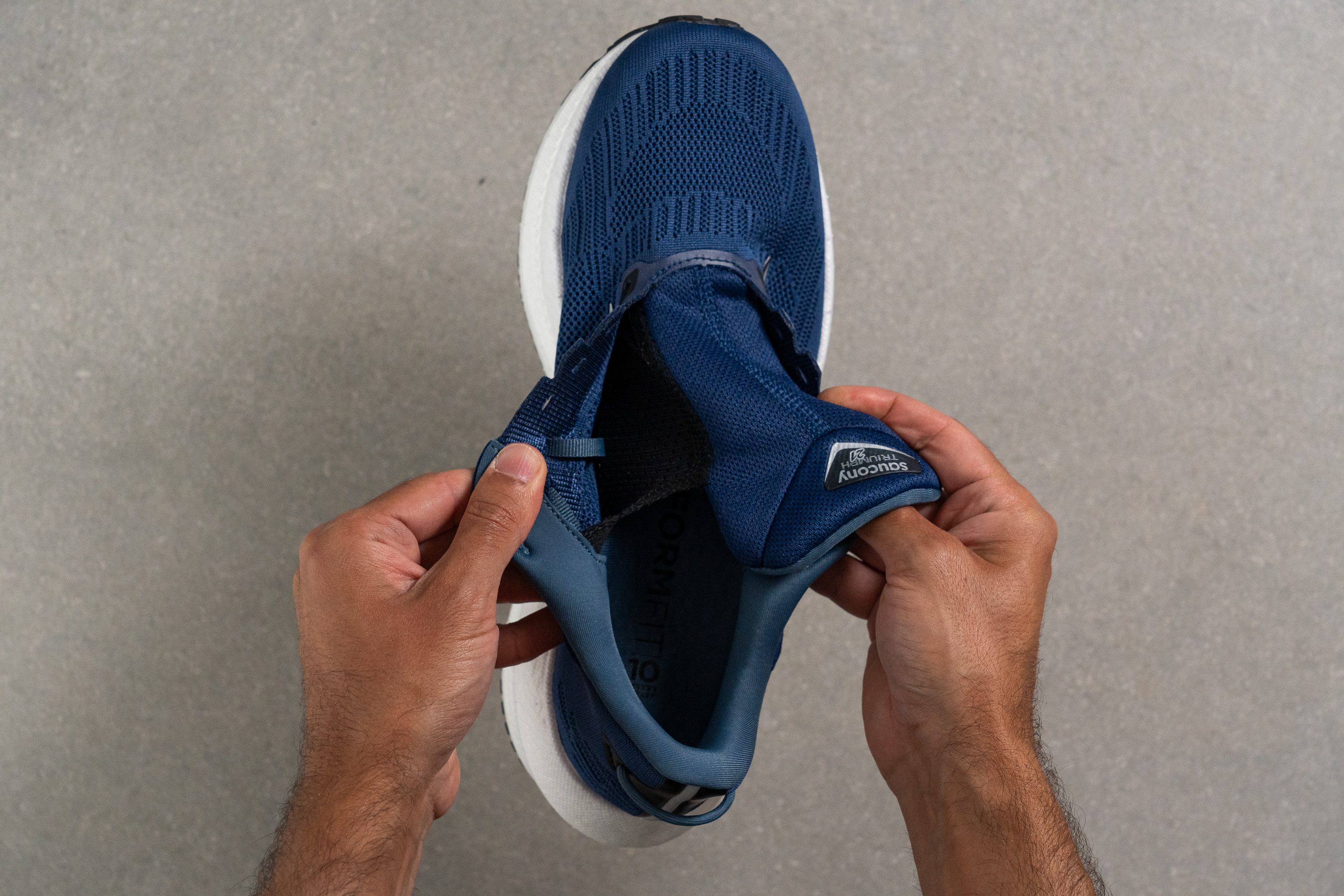
| Triumph 21 | Bootie |
Heel tab
There's a finger-loop heel tab. It's not just a fashion thing, but it also helps us slide our feet in with ease!
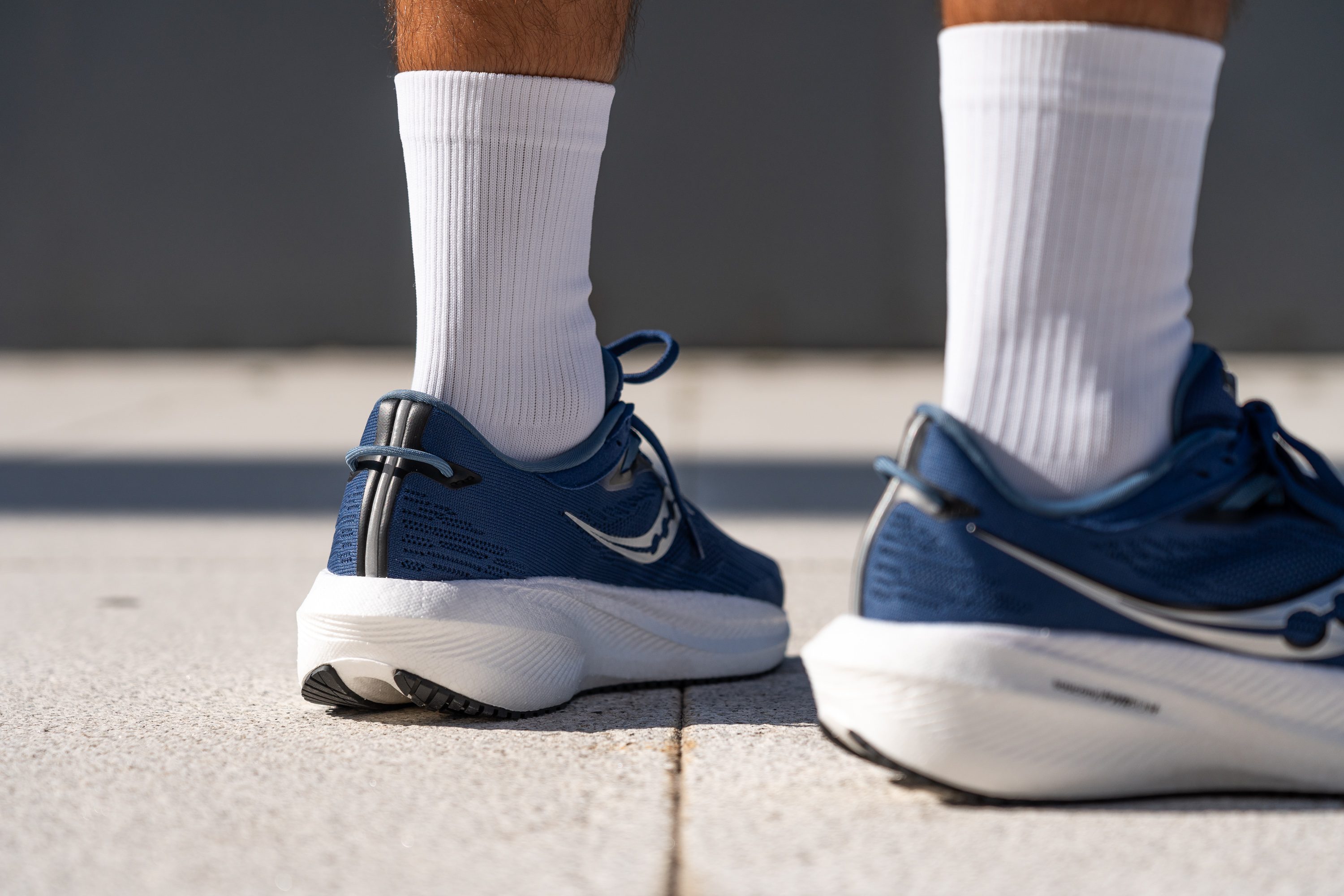
| Triumph 21 | Finger loop |

